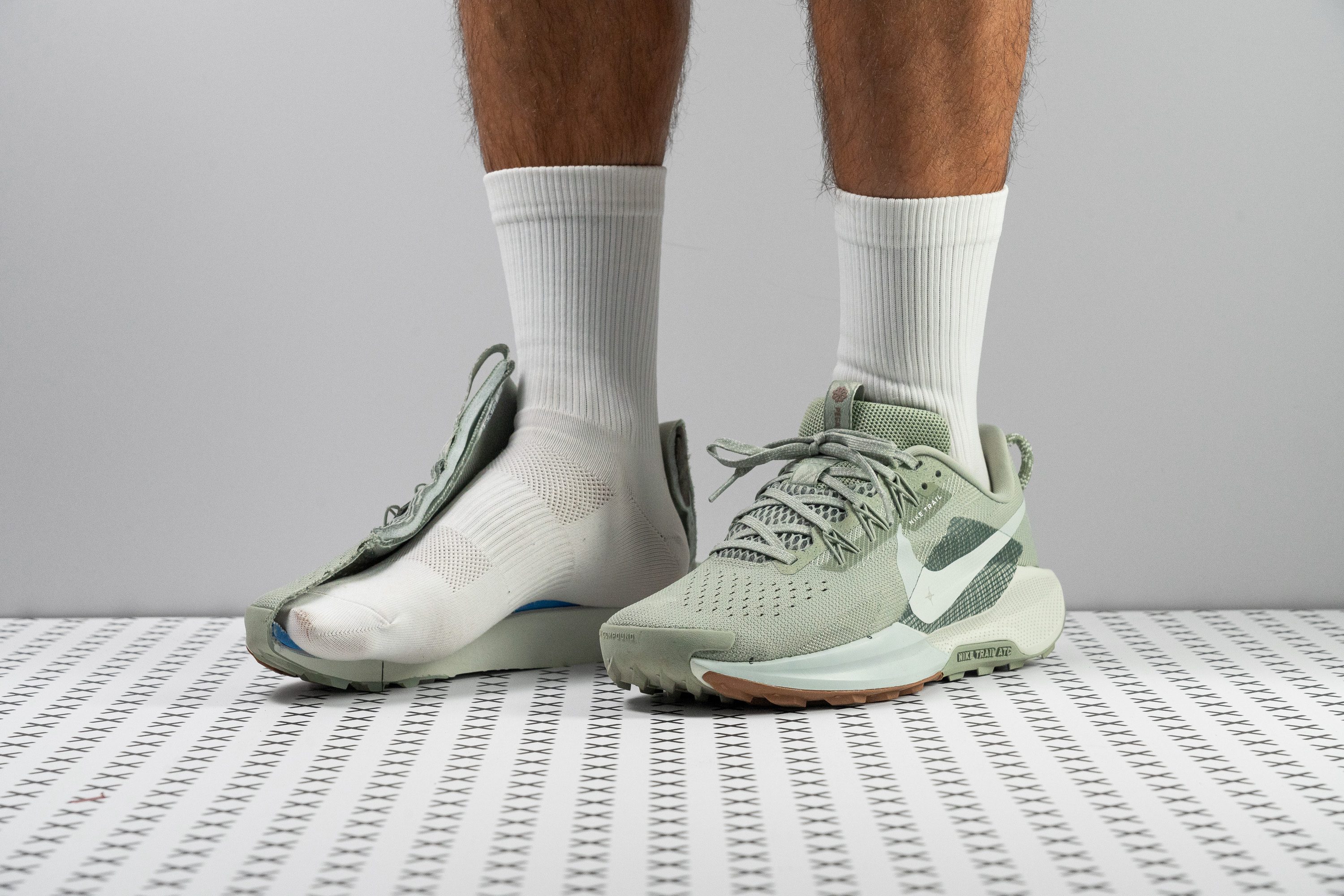Our verdict
- Top pick in best trail running shoes
- Top pick in best long distance Nike running shoes
Pros
- Fully gusseted tongue
- Reflective elements
- Durable upper construction
- New rockered sole
- Great for heel strikers
- Reasonably priced
- All-around comfort
Cons
- Weight increase
- Possibly too plush for trails
- Still lacks traction
Audience verdict
- Top 19% in trail running shoes
- Top 20% in Nike running shoes
- Top 13% most popular running shoes
Comparison
The most similar running shoes compared
+ + Add a shoe | |||||
|---|---|---|---|---|---|
| Audience score | 90 Superb! | 88 Great! | 87 Great! | 86 Good! | |
| Price | $150 | $150 | $100 | $100 | |
| Trail terrain | Light | Light | Light | Light | |
| Shock absorption | High | Moderate | Moderate | - | |
| Energy return | Moderate | Low | Low | - | |
| Arch support | Neutral | Neutral | Neutral | Neutral | |
| Weight lab Weight brand | 10.1 oz / 286g 10.1 oz / 286g | 10.3 oz / 292g 10.9 oz / 309g | 8.4 oz / 237g 8.6 oz / 243g | 9.9 oz / 282g 10.4 oz / 294.8g | |
| Lightweight | ✗ | ✗ | ✓ | ✗ | |
| Drop lab Drop brand | 9.6 mm 9.5 mm | 6.0 mm 5.0 mm | 11.0 mm 6.0 mm | 9.2 mm 8.0 mm | |
| Strike pattern | HeelMid/forefoot | Mid/forefoot | Heel | HeelMid/forefoot | |
| Size | True to size | True to size | True to size | True to size | |
| Midsole softness | Soft | Balanced | Soft | Balanced | |
| Difference in midsole softness in cold | Normal | Small | Small | Big | |
| Toebox durability | Very good | Decent | Bad | Bad | |
| Heel padding durability | Good | Bad | Decent | Bad | |
| Outsole durability | Good | Good | Decent | Decent | |
| Breathability | Warm | Warm | Moderate | Moderate | |
| Width / fit | Medium | Narrow | Narrow | Medium | |
| Toebox width | Medium | Medium | Medium | Wide | |
| Stiffness | Moderate | Moderate | Moderate | Stiff | |
| Torsional rigidity | Moderate | Stiff | Stiff | Moderate | |
| Heel counter stiffness | Stiff | Moderate | Flexible | Stiff | |
| Lug depth | 3.2 mm | 3.1 mm | 2.0 mm | 2.7 mm | |
| Heel stack lab Heel stack brand | 34.6 mm 37.0 mm | 31.7 mm 29.0 mm | 32.3 mm 26.0 mm | 32.1 mm 30.0 mm | |
| Forefoot lab Forefoot brand | 25.0 mm 27.5 mm | 25.7 mm 24.0 mm | 21.3 mm 20.0 mm | 22.9 mm 22.0 mm | |
| Widths available | NarrowNormalWide | Normal | NormalWide | Normal | |
| Season | All seasons | All seasons | All seasons | All seasons | |
| Removable insole | ✓ | ✓ | ✓ | ✓ | |
| Orthotic friendly | ✓ | ✓ | ✓ | ✓ | |
| Ranking | #82 Top 22% | #137 Top 36% | #148 Top 39% | #186 Top 49% | |
| Popularity | #49 Top 13% | #185 Top 49% | #299 Bottom 22% | #317 Bottom 17% |
Who should buy
We think the Nike Pegasus Trail 5 is a fantastic update for:
- Beginners to trail running seeking a versatile, well-cushioned, and value-packed shoe that can handle various terrains with ease.
- Heel strikers who found previous Pegasus Trails flat—the new rocker design and enhanced cushioning favor their footstrike, providing a smoother ride.
- Adventurers with wide feet in need of a reliable, comfortable travel companion that excels in both trail and casual walks.
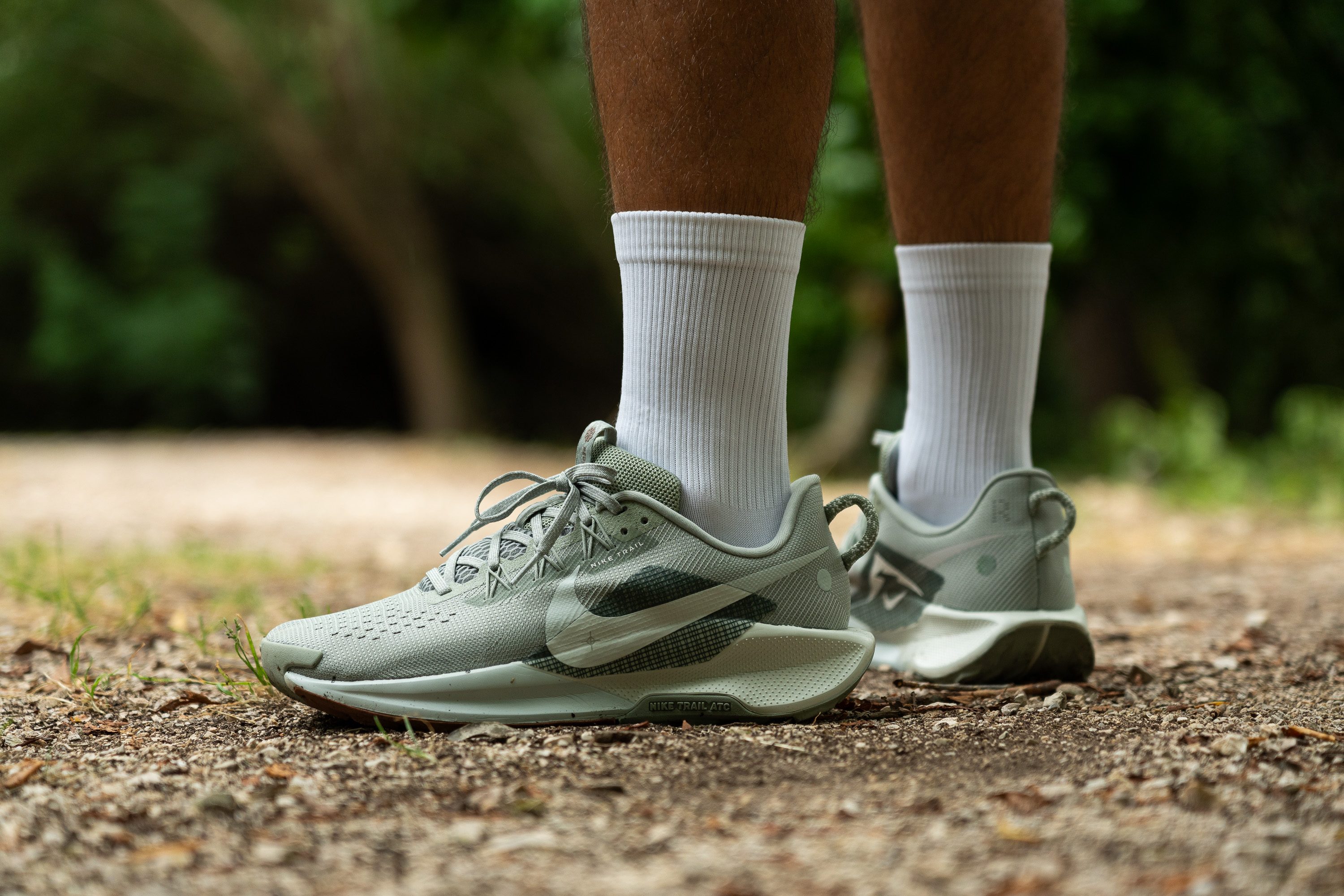
Who should NOT buy
We believe that the Nike Pegasus Trail 5 offers a notable update with its ReactX midsole, providing improved cushioning, but it still falls short of Nike’s premium ZoomX foam and lacks a world-class outsole. For those seeking top-tier cushioning coupled with Vibram rubber, we recommend upgrading to the Nike Zegama 2, which also offers superior breathability.
While we also found the Pegasus Trail 5 accommodating for wide feet, its broad toebox might be less appealing to those with narrower or average-width feet. Instead of sizing down, we suggest the Merrell Nova 3, which provides a snug fit while maintaining versatile road-to-trail functionality.
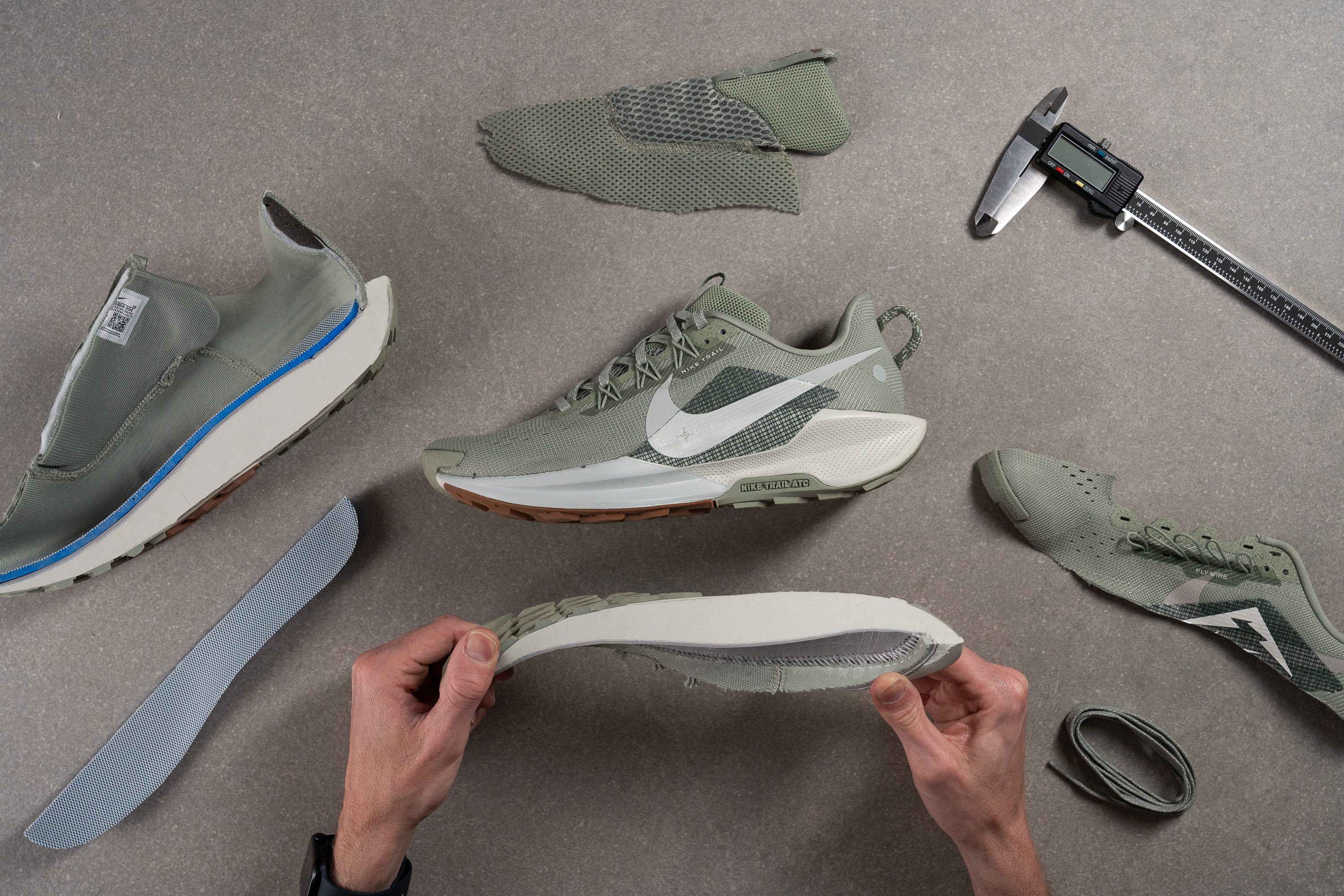
Cushioning
Shock absorption
One of the most intriguing traits of the Peg Trail 5 comes from its midsole, delivering superb shock absorption for heel strikers at 136 SA. Conversely, the forefoot is closer to average at 100 SA, though still solid for most runs.
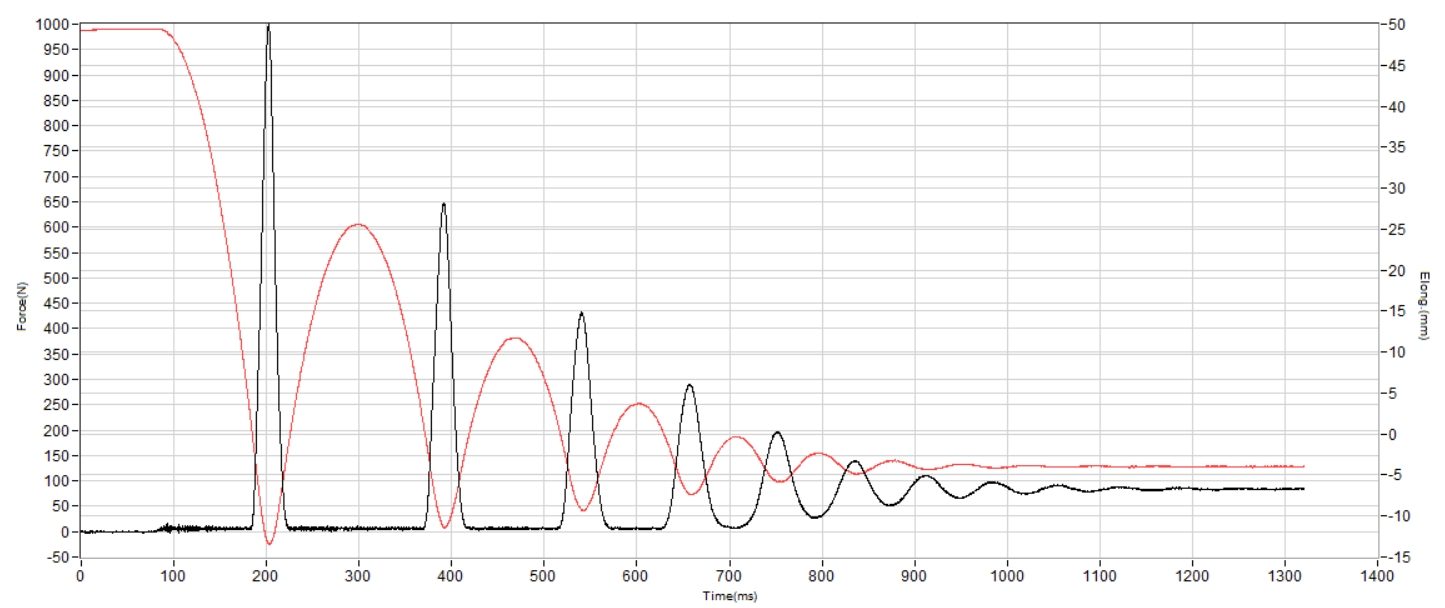
| Pegasus Trail 5 | 136 SA |
| Average | 122 SA |
Energy return
The ReactX midsole that the Pegasus Trail series inherits from its road sibling does the job, but it’s far from groundbreaking. Back in the lab we measured 57.6% of energy return, which is perfectly fine, but nothing to get excited about.
| Pegasus Trail 5 | 57.6% |
| Average | 55.3% |
Heel stack
Nike is embracing the maximalist design with the Pegasus Trail series, which has significantly evolved from its early versions by adding substantial cushioning. We measured version 5 with a heel stack height of 34.6 mm, approaching the 40-mm mark.
Moreover, the PT5's cushioning increases towards the midfoot, providing a super-stacked and exceptionally well-cushioned feel, making it a prime choice for the most extreme heel strikers.
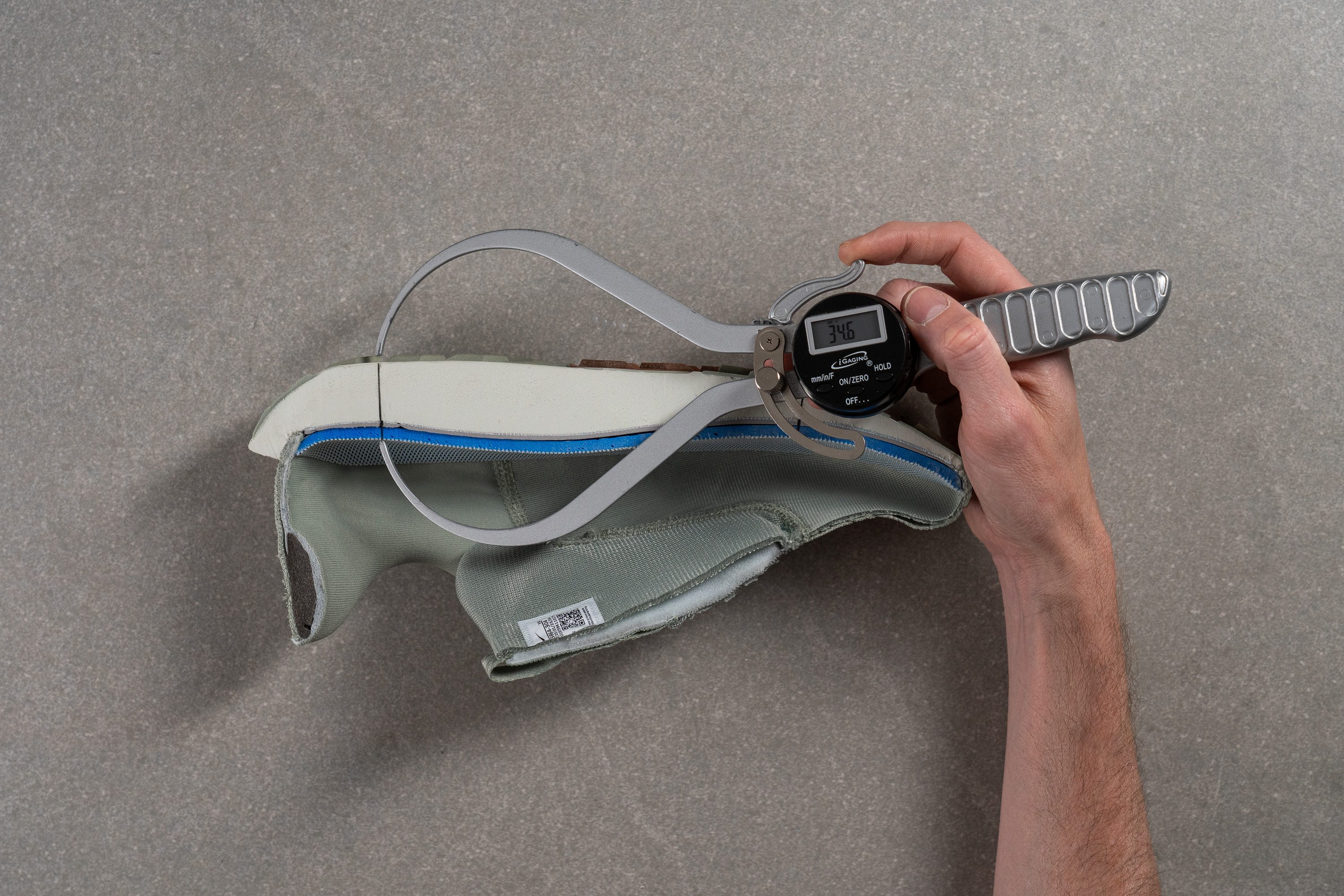
| Pegasus Trail 5 | 34.6 mm |
| Average | 32.6 mm |
Forefoot stack
During our fast-paced runs, when landing on the forefoot, we noticed less cushioning, which can be attributed to the shoe's high drop. We measured this area at just 25.0 mm, which is more standard compared to the nearly maximalist heel cushioning.
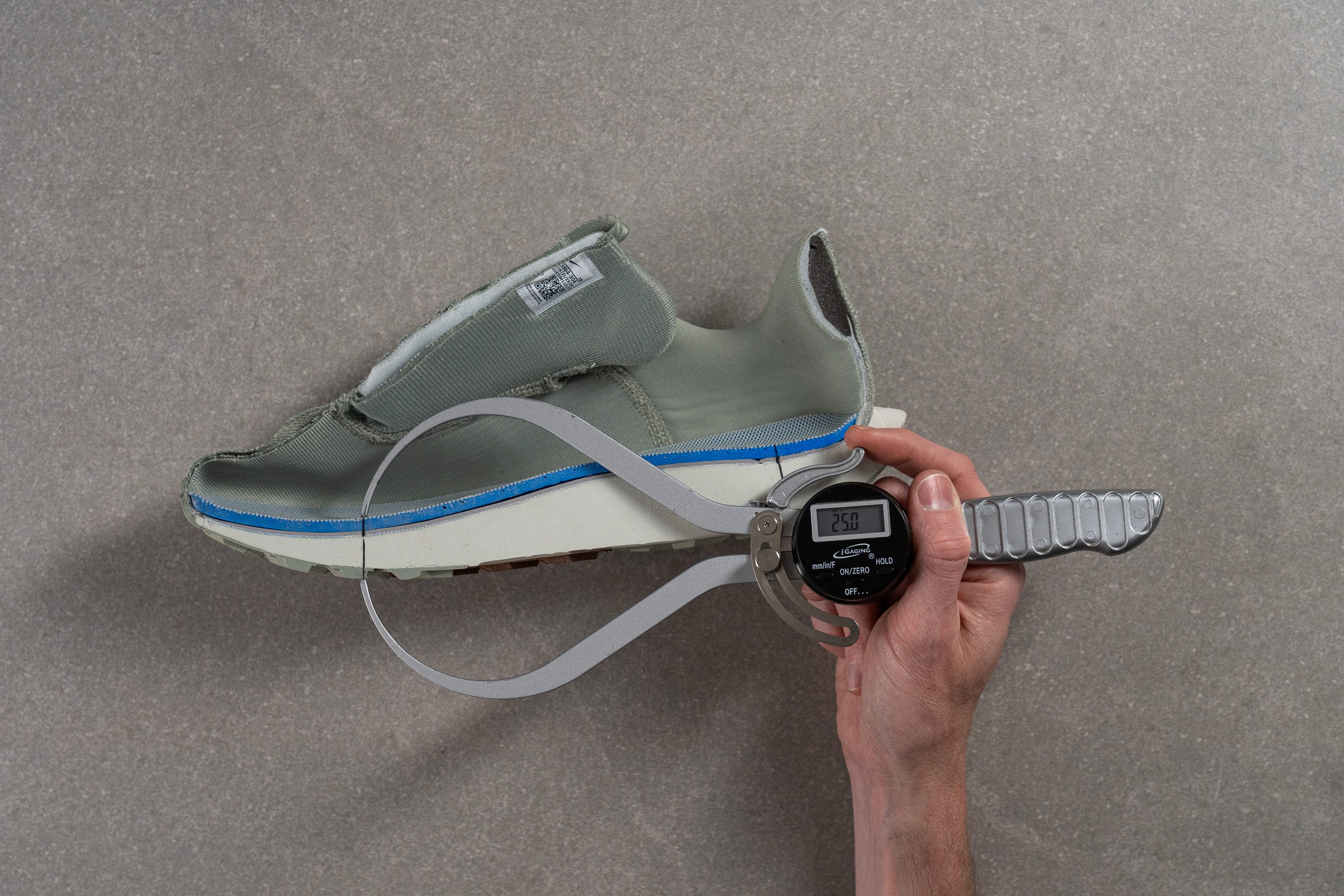
| Pegasus Trail 5 | 25.0 mm |
| Average | 25.1 mm |
Drop
We previously hinted at the high drop, and indeed, Nike claims it's 9.5 mm—our measurements show 9.6 mm. This slight discrepancy is negligible and underscores our impression that this shoe is exceptionally well-constructed, with fewer manufacturing inconsistencies than we've seen in some other Nikes.
This drop is typical for the Pegasus series. This design effectively accommodates all types of footstrikes and is particularly effective for beginners.
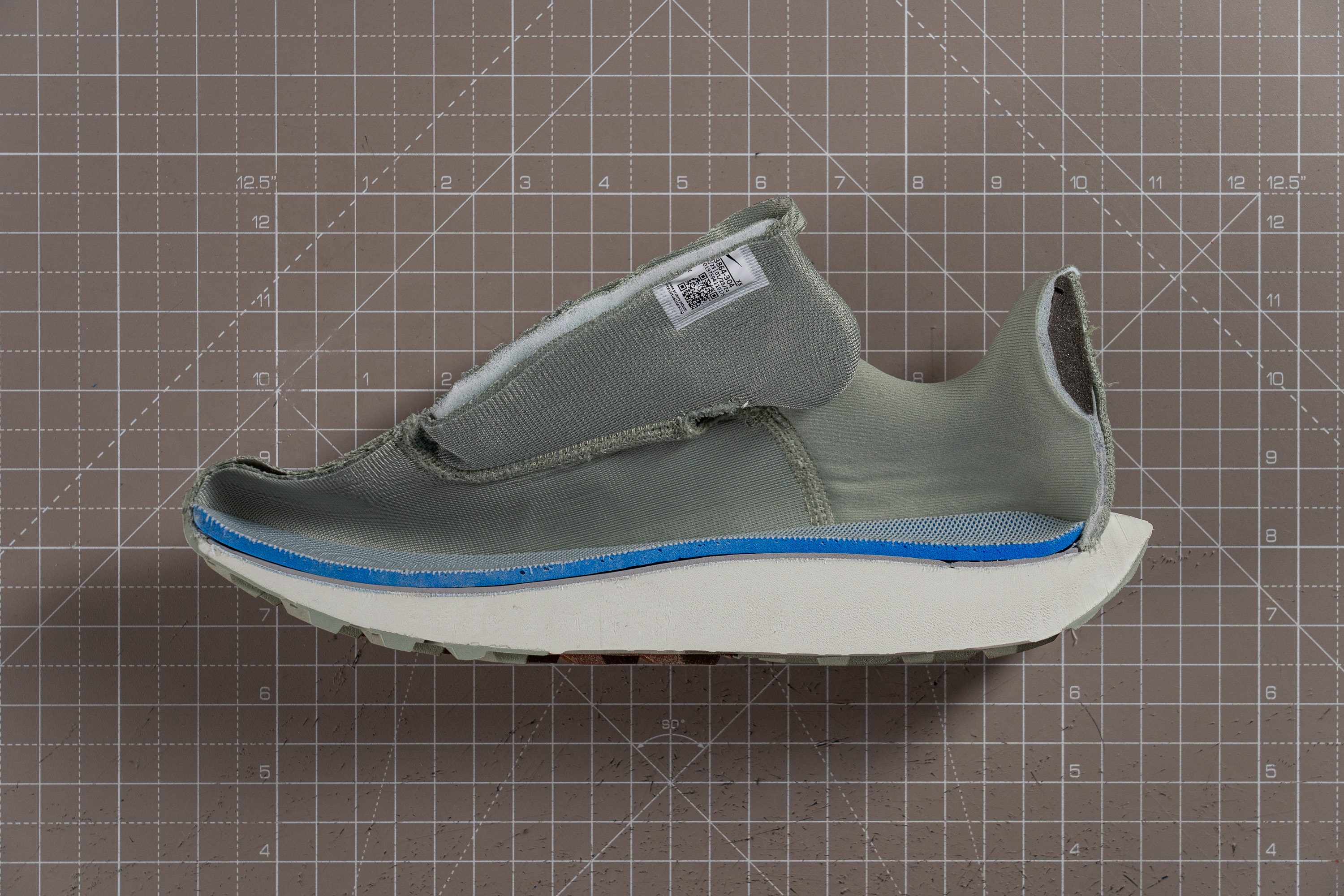
| Pegasus Trail 5 | 9.6 mm |
| Average | 7.6 mm |
Midsole softness
UpdatedThe Pegasus Trail 5 introduces ReactX, a new foam that Nike debuted with the InfinityRN 4, but is new to their trail lineup.
This foam is significantly softer (31.1 AC) than the previous React, providing an incredibly plush feel underfoot. While this high level of cushioning might not suit everyone on the trails—where a firmer ride can be preferable—it offers exceptional protection on easier trails and road sections.
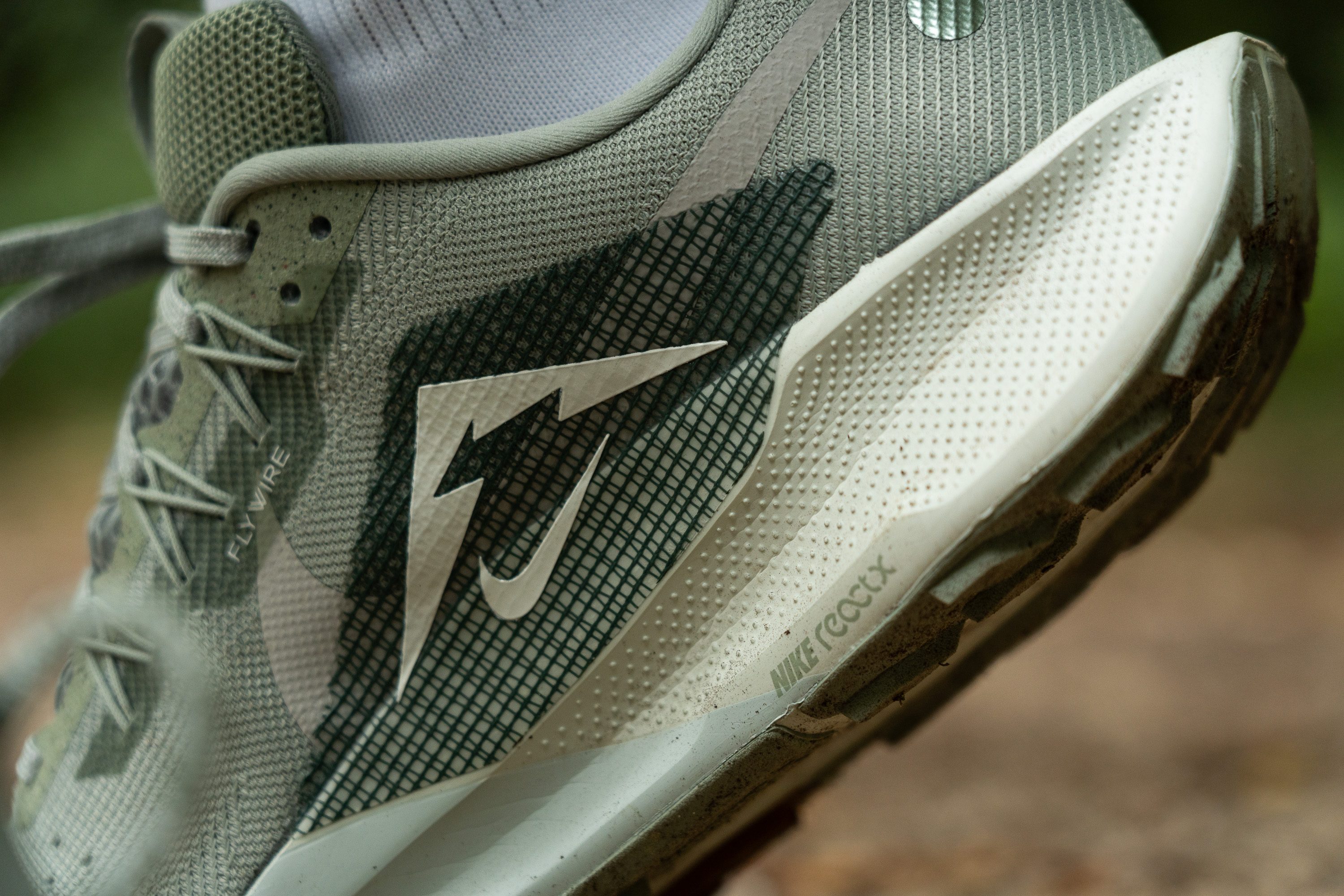
Moreover, the bounce we felt from ReactX is notably superior compared to the original React, a difference that's especially apparent given the previous version, the Pegasus Trail 4, often felt somewhat dull and flat. However, this plush midsole may not appeal to all trail runners...
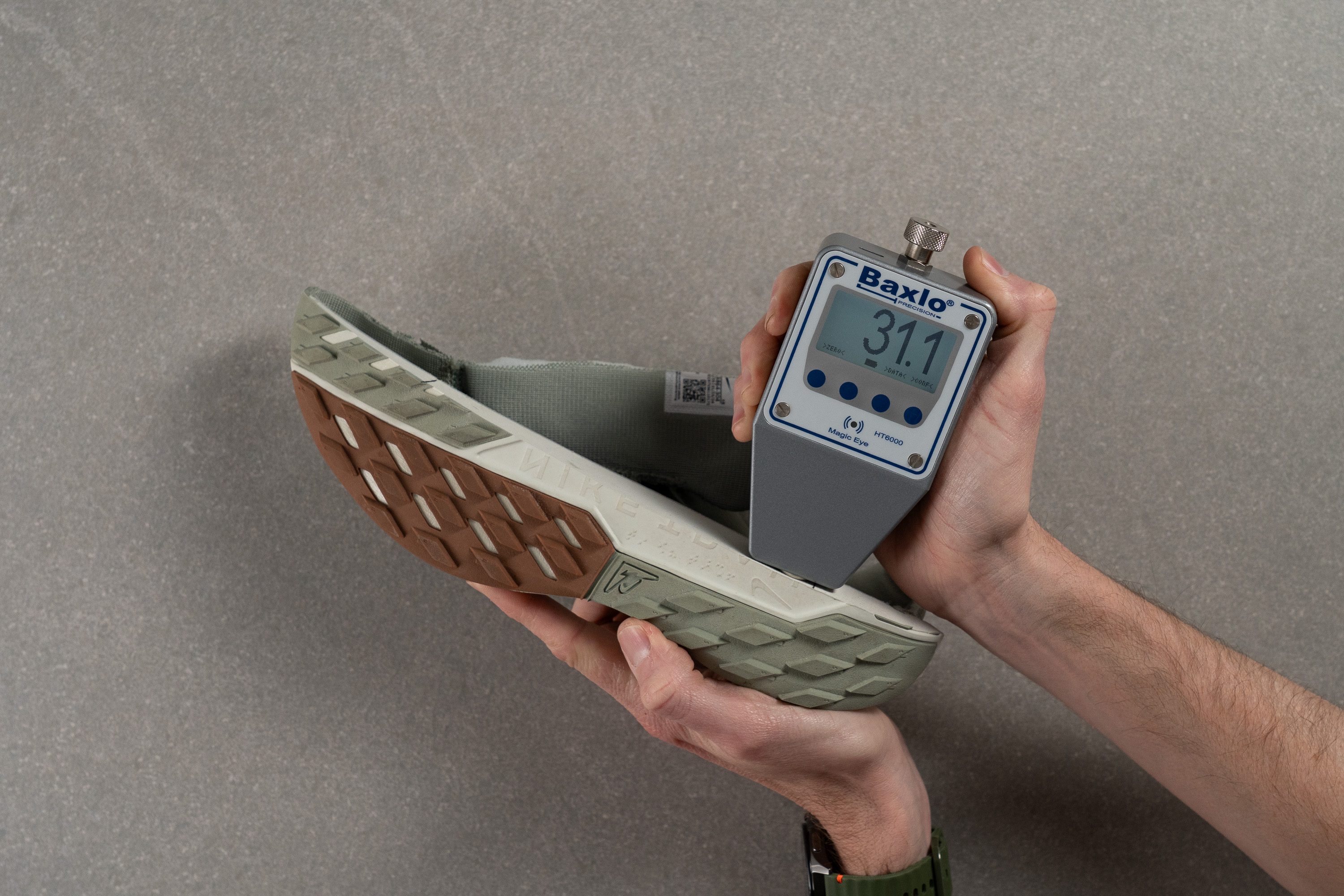
| Pegasus Trail 5 | 31.1 AC |
| Average | 37.5 AC |
Rocker
Previously, Nike Pegasus Trail shoes had not featured a rockered sole, but this has now changed. Like the increased midsole softness, not everyone welcomes this new design.
Those accustomed to rockered soles will likely embrace this update. Rearfoot strikers, in particular, will benefit from the newly designed heel bevel, which significantly smooths heel-to-toe transitions. However, runners who prioritize stability and a more classic feel might prefer the flatter Pegasus Trail 4 design.
Size and fit
Size
Nike Pegasus Trail 5 fits true to size (195 votes).
Internal length
| Pegasus Trail 5 | 270.6 mm |
| Average | 269.0 mm |
Width / Fit
The Pegasus Trail series has always aimed to reflect the same all-around versatility as the regular Pegasus, designed to suit as many individuals as possible. Based on this, we expected balanced dimensions here.
We created a gel replica of the shoe's interiors using our custom gel formula and discovered that, at 95.4 mm, it offers average width in the broadest part of the upper—a result that, in our view, aligns perfectly with our expectations.
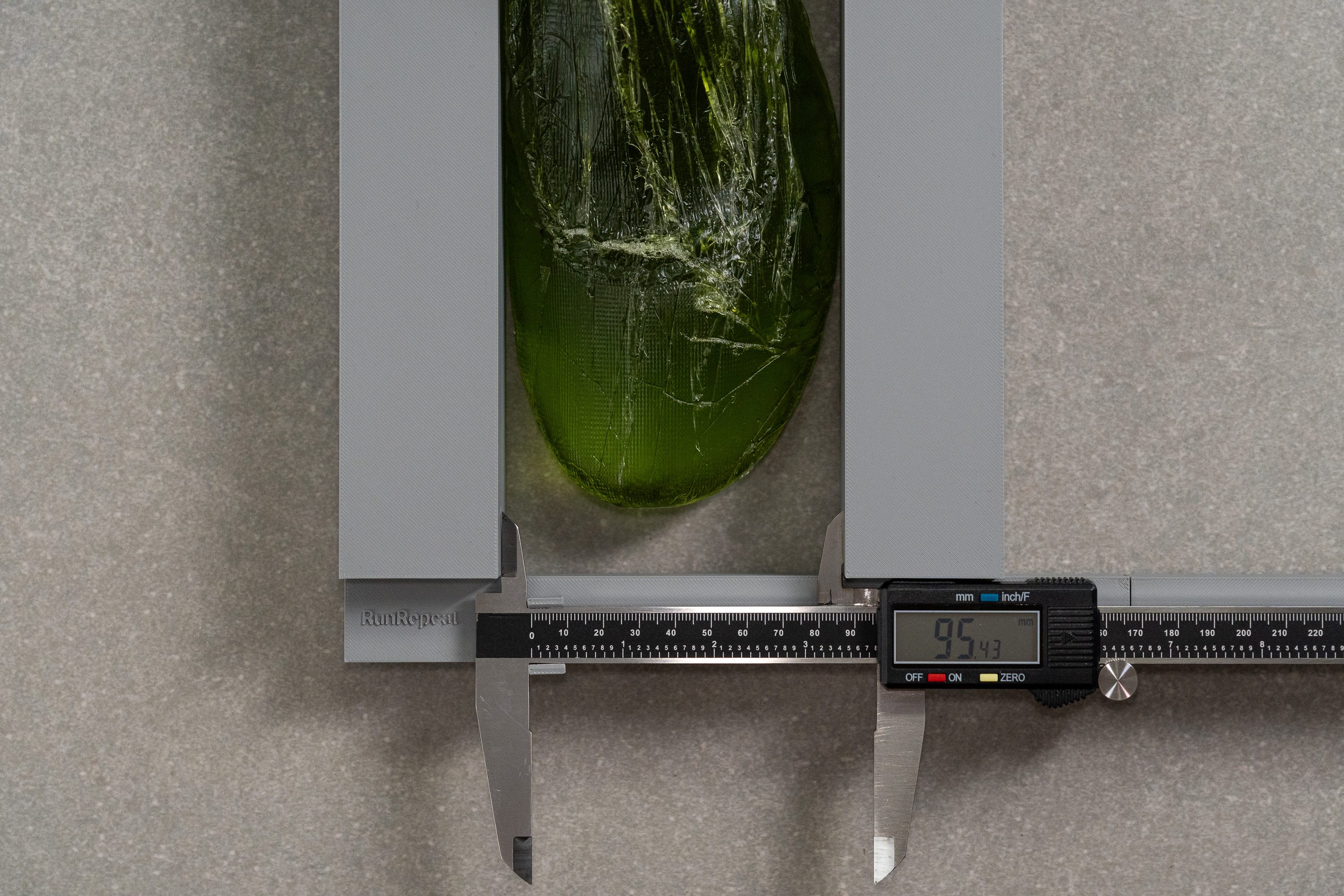
| Pegasus Trail 5 | 95.4 mm |
| Average | 95.6 mm |
Toebox width
If Nike aimed to make the toebox as balanced as possible, they clearly succeeded. At 74.5 mm, it doesn’t feel narrow, but it’s far from wide. There’s just enough room for minimal toe splay.
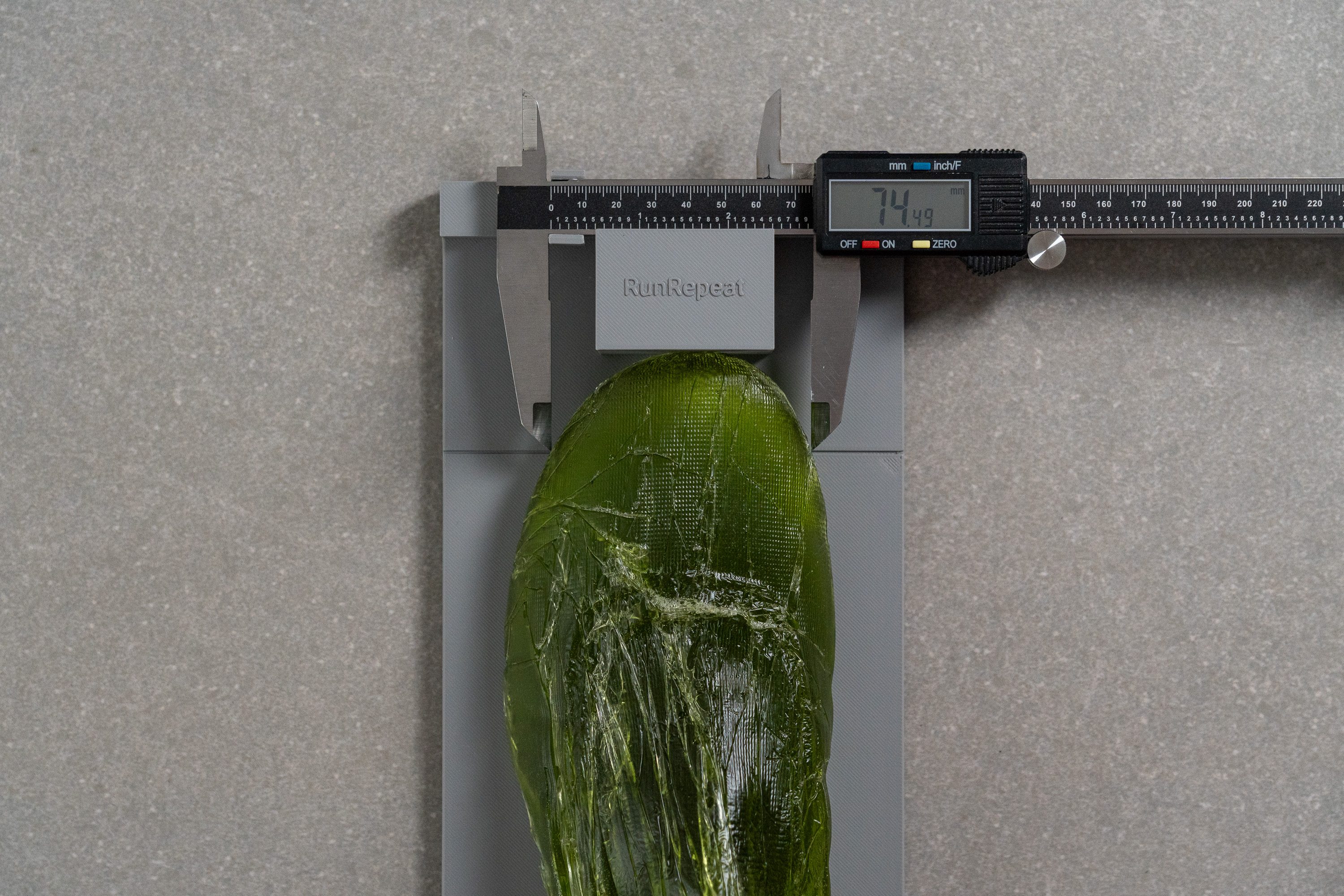
| Pegasus Trail 5 | 74.5 mm |
| Average | 74.6 mm |
Toebox height
We measured the toebox height of the upper at the same point as every other shoe and, unsurprisingly, found another perfectly average result at 26.6 mm.
It’s clear that for Nike, "Pegasus" and "average" go hand in hand.
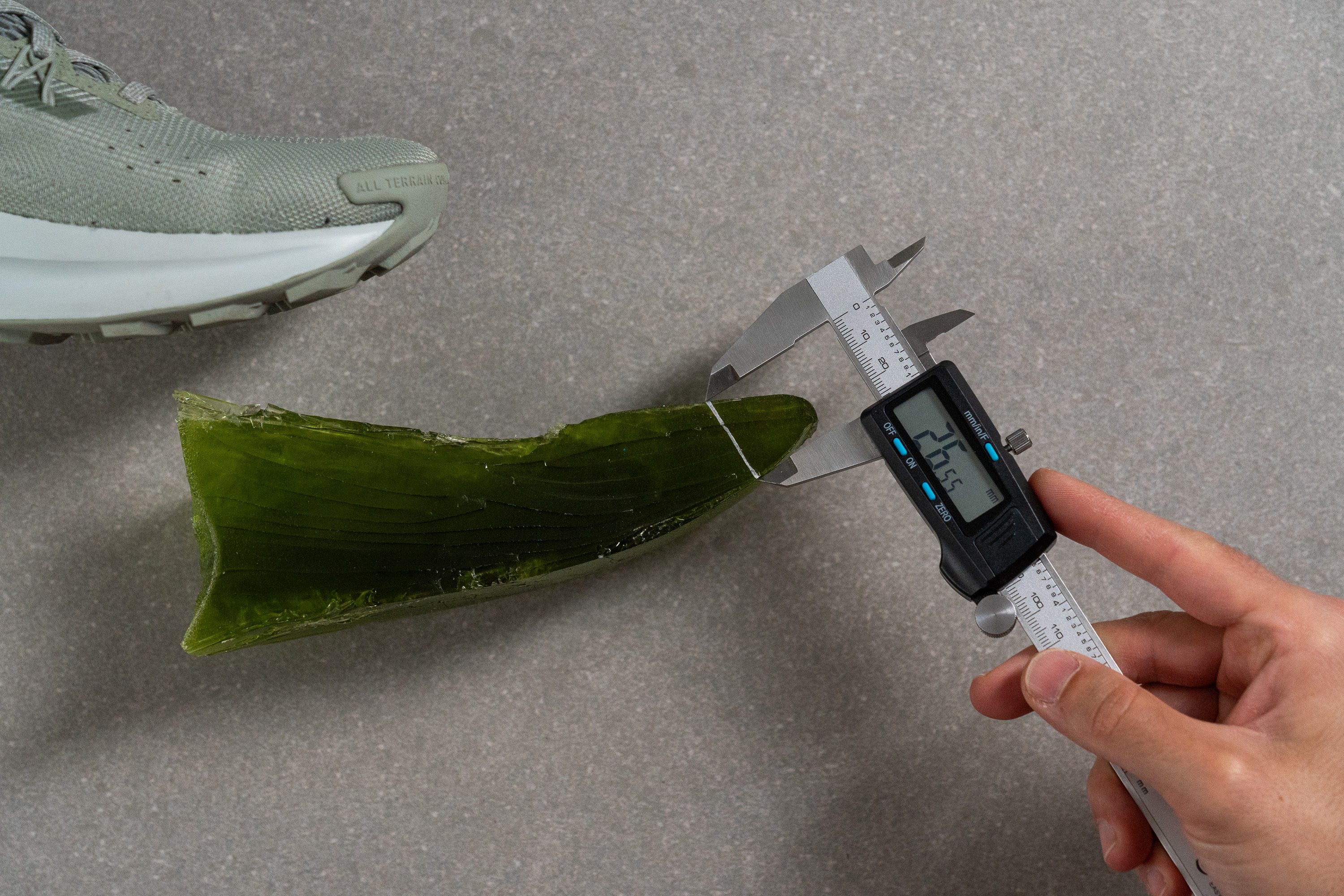
| Pegasus Trail 5 | 26.6 mm |
| Average | 27.0 mm |
Traction / Grip
Forefoot traction
| Pegasus Trail 5 | |
| Average | 0.61 |
Lug depth
Returning to the All Terrain Compound outsole, it was time to measure the lugs. Initially appearing shallow, our suspicion was confirmed with a precise 3.2-mm measurement using our vernier calipers.
We believe this depth is just ideal for a door-to-trail shoe—perfectly suited for handling easy or moderate terrains like gravel or dirt roads. And while they're not designed for highly technical terrain or muddy conditions, these lugs excel on dirt roads or coastal paths, making them highly versatile for the intended use of the Pegasus Trail.
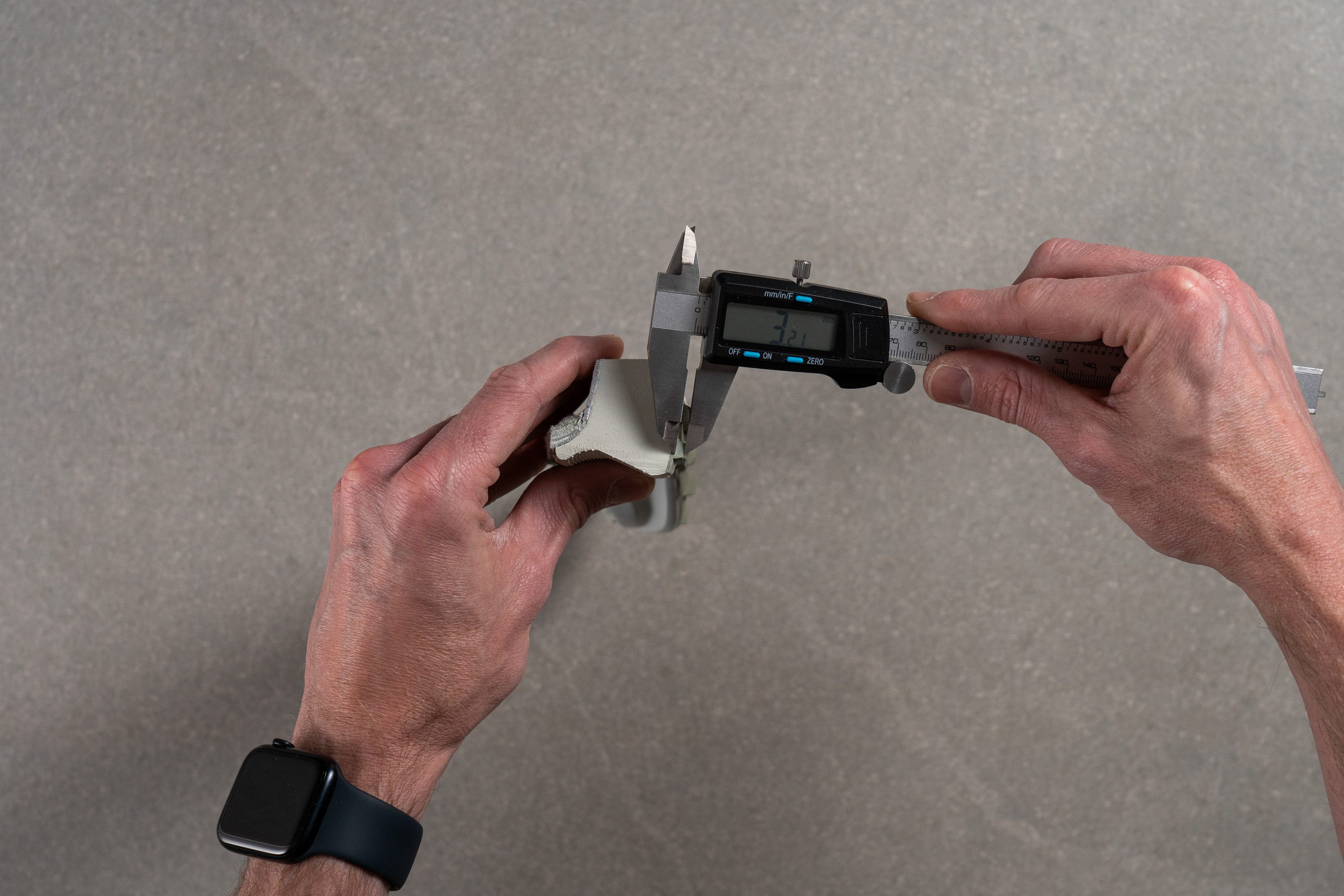
| Pegasus Trail 5 | 3.2 mm |
| Average | 3.5 mm |
Outsole design
The shoe features a large exposed midsole area in the center, enhanced by 22 cutouts in the forefoot. This design not only reduces the shoe's weight but also significantly boosts its flexibility.
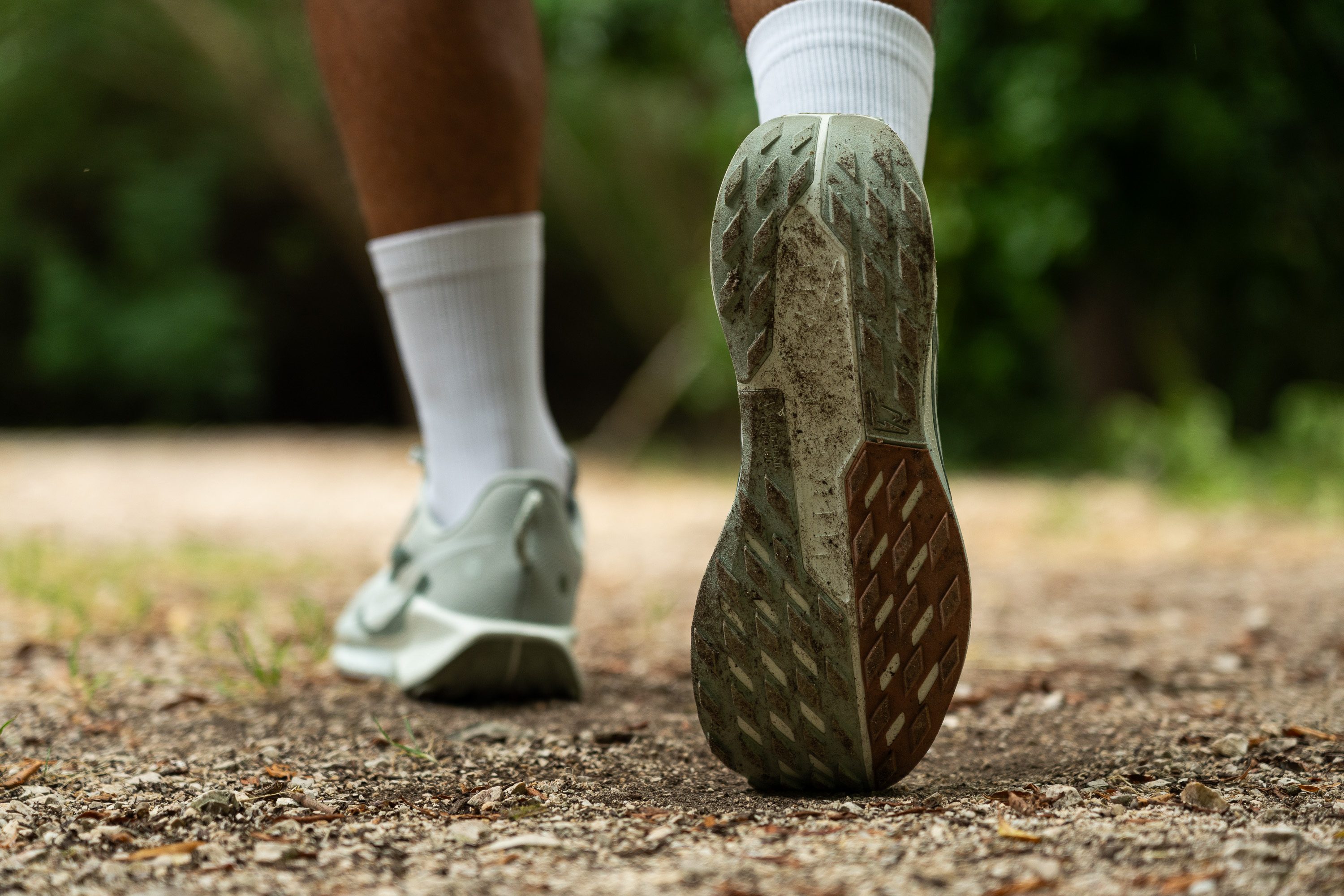
Flexibility / Stiffness
One concern we had was the potential stiffness of the Pegasus Trail 5, given market trends toward stiffer models.
Fortunately, we found in our 30-degree bend test (13.3N) that Nike maintained remarkable flexibility in the PT5, making it an excellent choice not only for running but also for walking, hiking, or navigating airports.
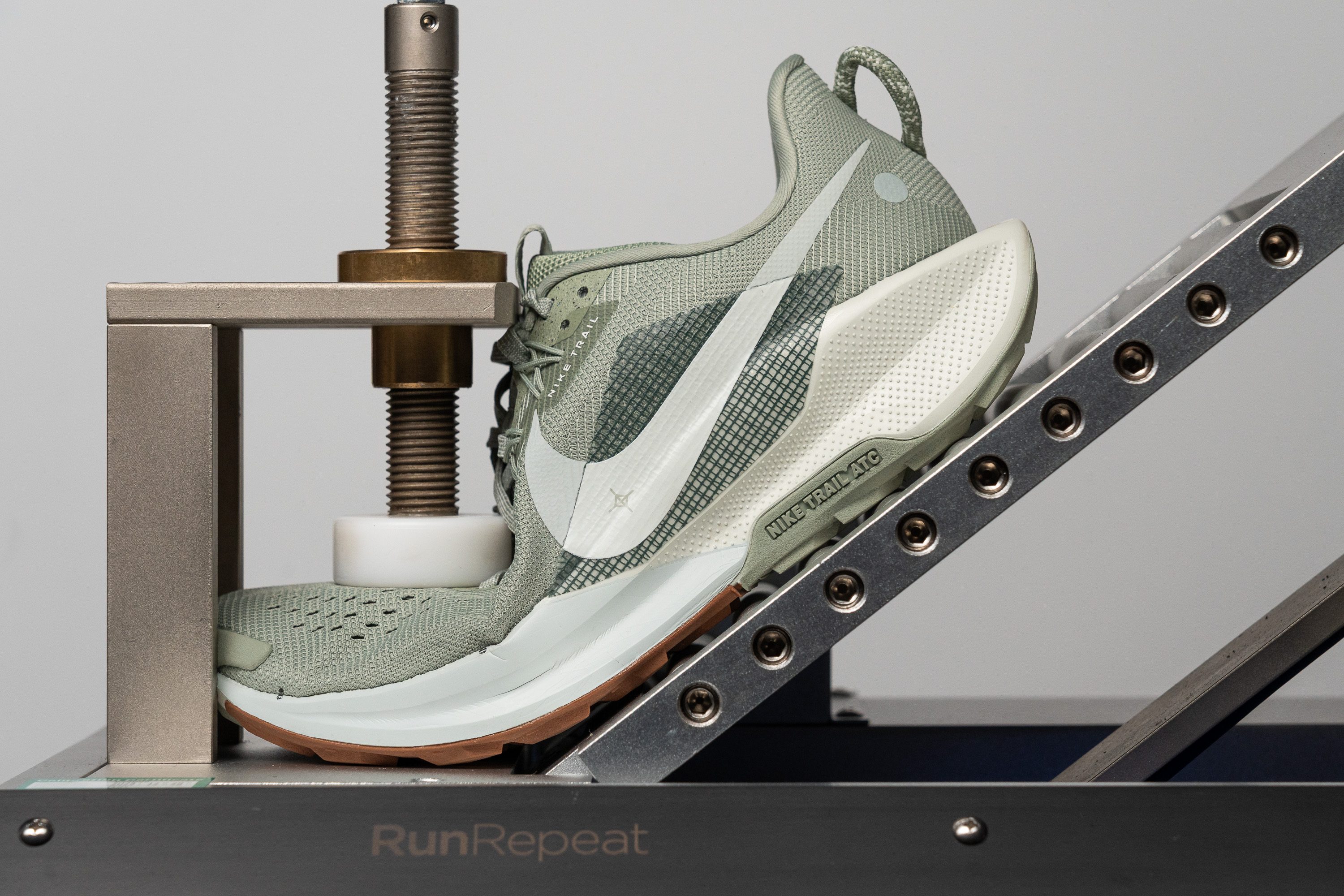
| Pegasus Trail 5 | 13.3N |
| Average | 14.6N |
Weight
The Pegasus Trail 5 tips the scales just over the sub-10-oz mark at 10.1 oz or 286g, a detail we find a bit disappointing. While it offers improved cushioning and a more comfortable upper, we firmly believe that a door-to-trail shoe like this should ideally weigh less than 10 ounces.
Is this a major concern for us? Nope. However, it would be great if Nike could reduce the weight in the next iteration of this model.
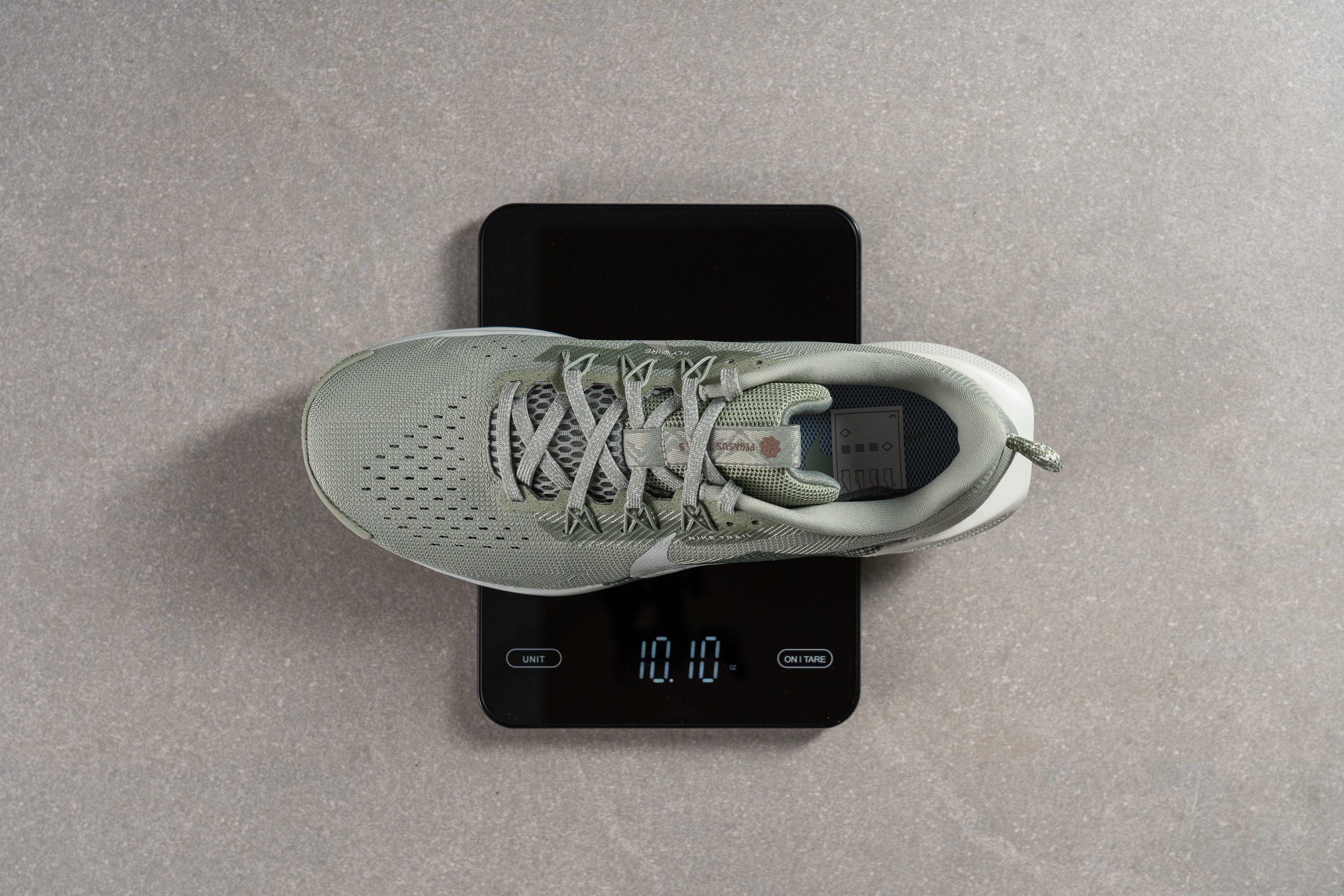
| Pegasus Trail 5 | 10.1 oz (286g) |
| Average | 10.2 oz (289g) |
Breathability
Trail shoes are often sturdier and less breathable than their road counterparts, which is generally a positive for us, as durability is crucial on trails. However, we found the Pegasus Trail 5 to be less breathable than expected, scoring just 2/5. For comparison, the Pegasus 41, its road sibling, scored 4/5.
However, this isn't a major concern unless you're planning to use them in extremely hot weather, which is rare in mountainous areas. In such cases, we recommend at least pairing the shoes with thin, moisture-wicking socks to compensate for the reduced airflow.
Despite having ventilation holes in the toebox with a cool asymmetric design to protect the inner side, we found they weren't very effective. Our microscope revealed why.
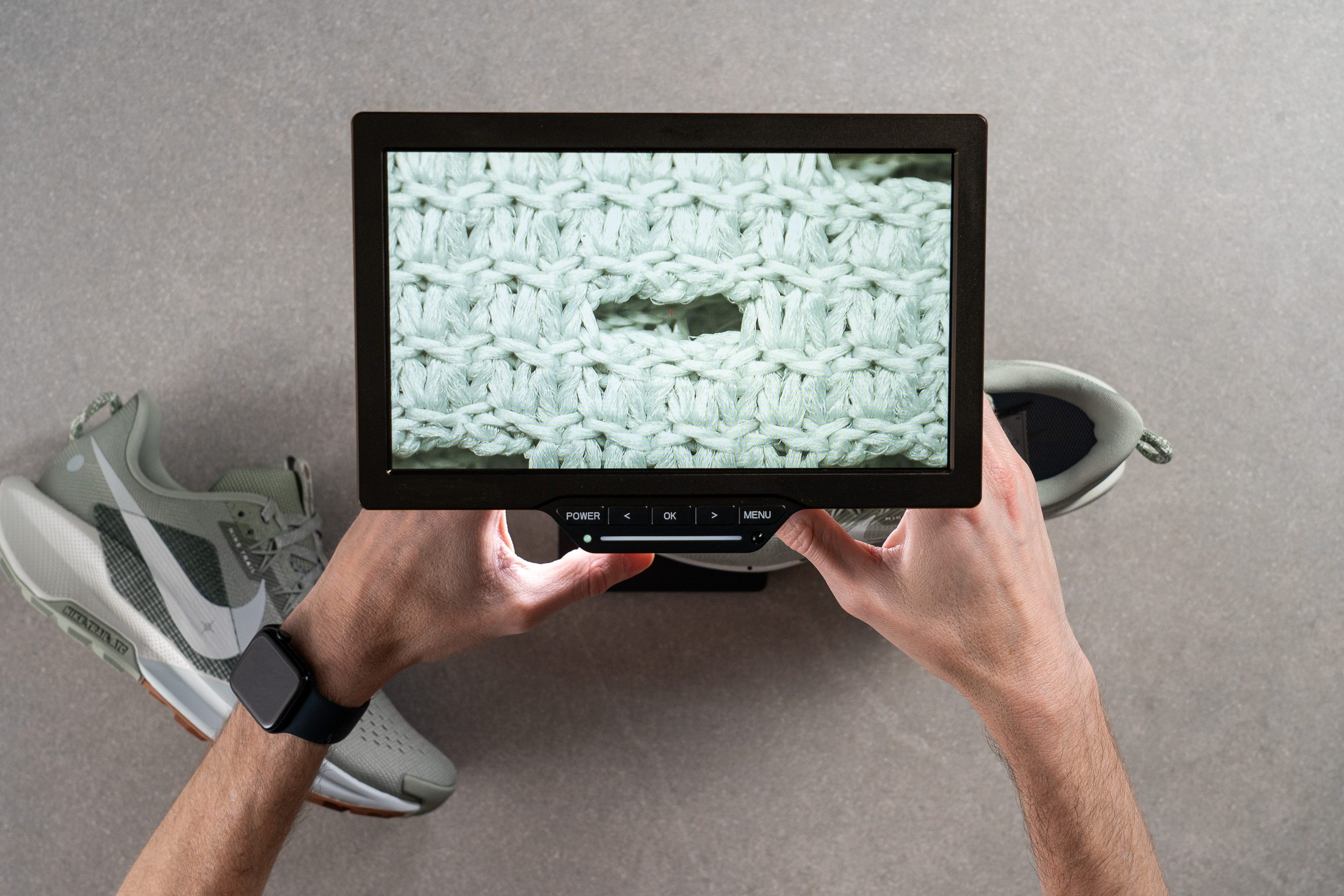
As shown in the microscopic image, Nike has added a protective layer beneath the upper for improved durability, which we'll discuss later.

We also examined the upper by hand and liked every detail of this update. To be honest, for $150, few shoes offer better materials.
| Pegasus Trail 5 | 2 |
| Average | 3.3 |
Stability
Lateral stability test
We've observed that stability has slightly declined with the introduction of the new rocker and plush midsole in the Pegasus Trail 5, demonstrating that trade-offs are inevitable—there are no miracles in life, but especially in running shoes.
Nonetheless, while it's not a wobbly shoe, it certainly lacks the stability that characterized the previous four editions, making it a less supportive choice for those who relied on that aspect.
Torsional rigidity
To address the downgrade in stability, Nike changed the torsional rigidity slightly, bringing it to a 3-out-of-5 on our scale. Despite this, the shoe remains flexible, which we appreciate in an all-around shoe.
| Pegasus Trail 5 | 3 |
| Average | 3.6 |
Heel counter stiffness
Nike adopted a similar approach with the heel counter in this version, enhancing its stiffness from a 3/5 to a 4/5 on our scale. This minor adjustment, though possibly unnoticed by every runner, was crucial to balance the softness of the new midsole.
| Pegasus Trail 5 | 4 |
| Average | 3 |
Midsole width - forefoot
We then turned our attention to the midsole. Nike has traditionally designed the Pegasus Trail with a relatively narrow platform.
In the 5th version, they've introduced a slight increase in width to 113.4 mm, which (again) subtly enhances stability, making the shoe more appealing while maintaining an average width.
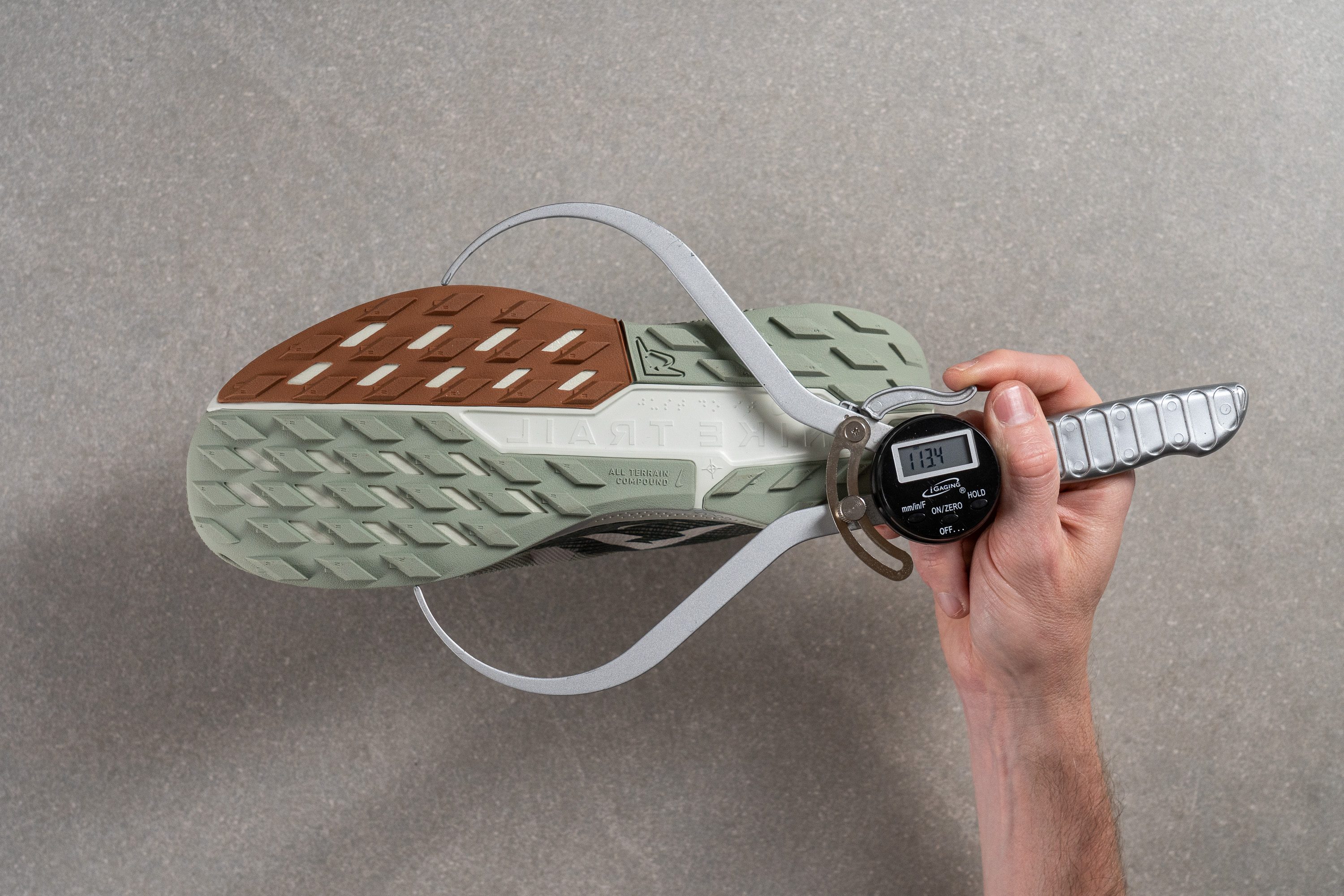
| Pegasus Trail 5 | 113.4 mm |
| Average | 112.8 mm |
Midsole width - heel
The same concept applies to the heel area, though it's slightly narrower than typical in comparable trail shoes. We measured it at 87.7 mm, which shows a modest increase over its predecessor.
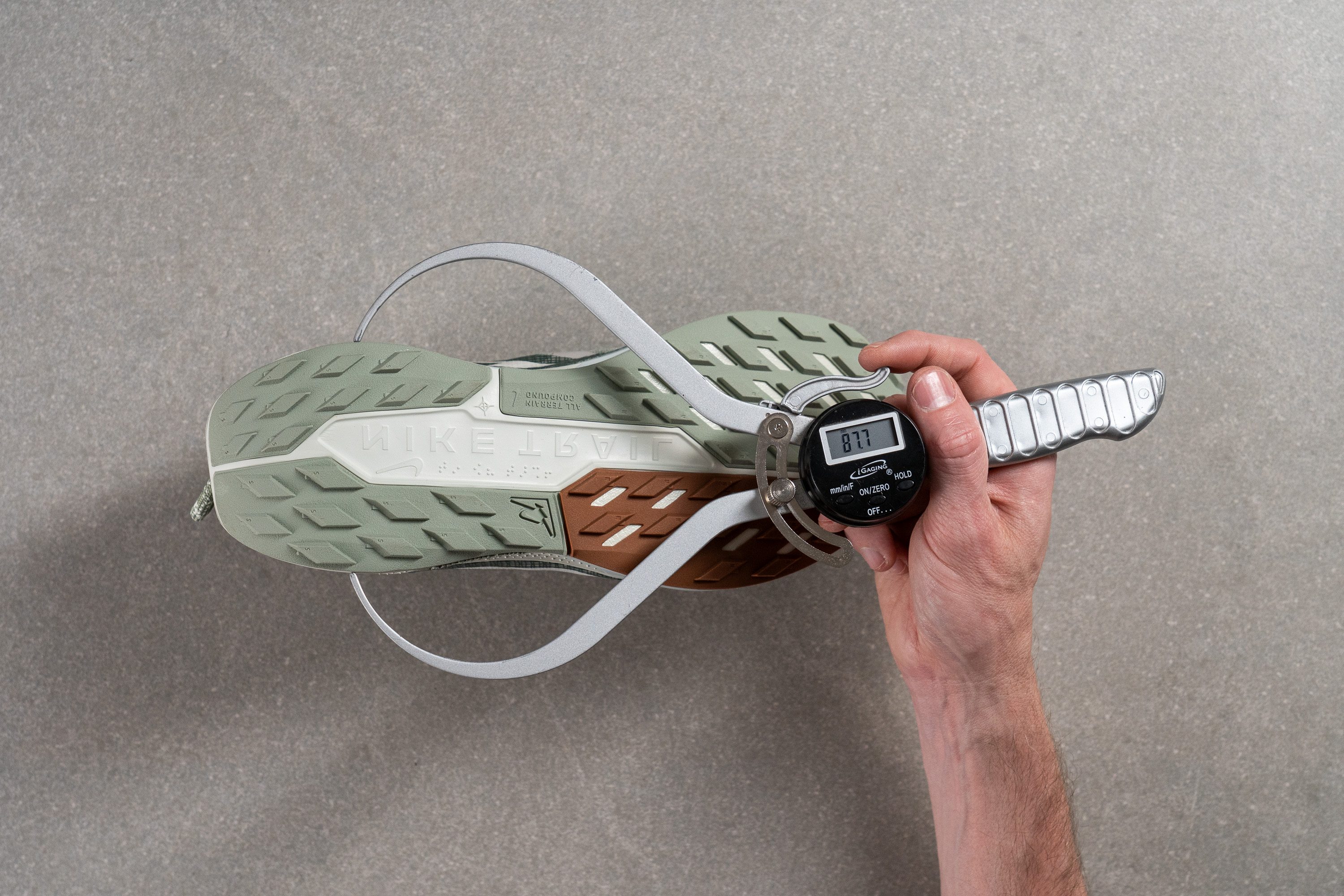
| Pegasus Trail 5 | 87.7 mm |
| Average | 89.9 mm |
Durability
Toebox durability
We hinted at the impressive durability of this upper in our previous test, and based on our experience with hundreds of running shoes in the lab, we were confident that the Peg Trail 5 would excel in our first Dremel test.
And indeed, that's exactly what we found. An outstanding 5/5 rating ensures that the upper won't face any durability issues, even in the long run.
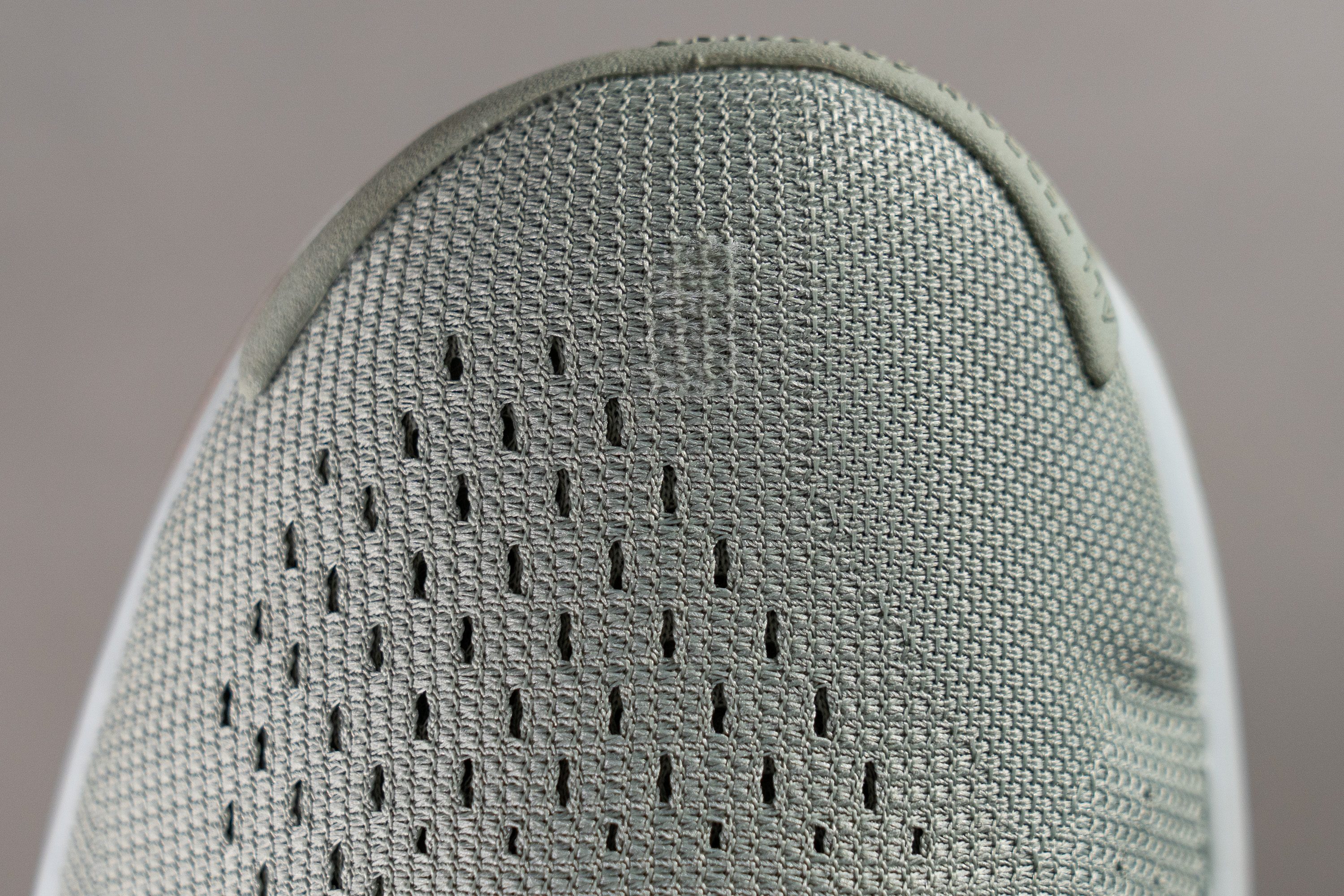
| Pegasus Trail 5 | 5 |
| Average | 3.1 |
Heel padding durability
We've already established that the toebox is a marvel in durability, but what about the heel collar?
We were thrilled to discover another strong performance here with a 4/5 rating, surpassing our expectations. Now, we're eager to see if the outsole continues this streak of good news!
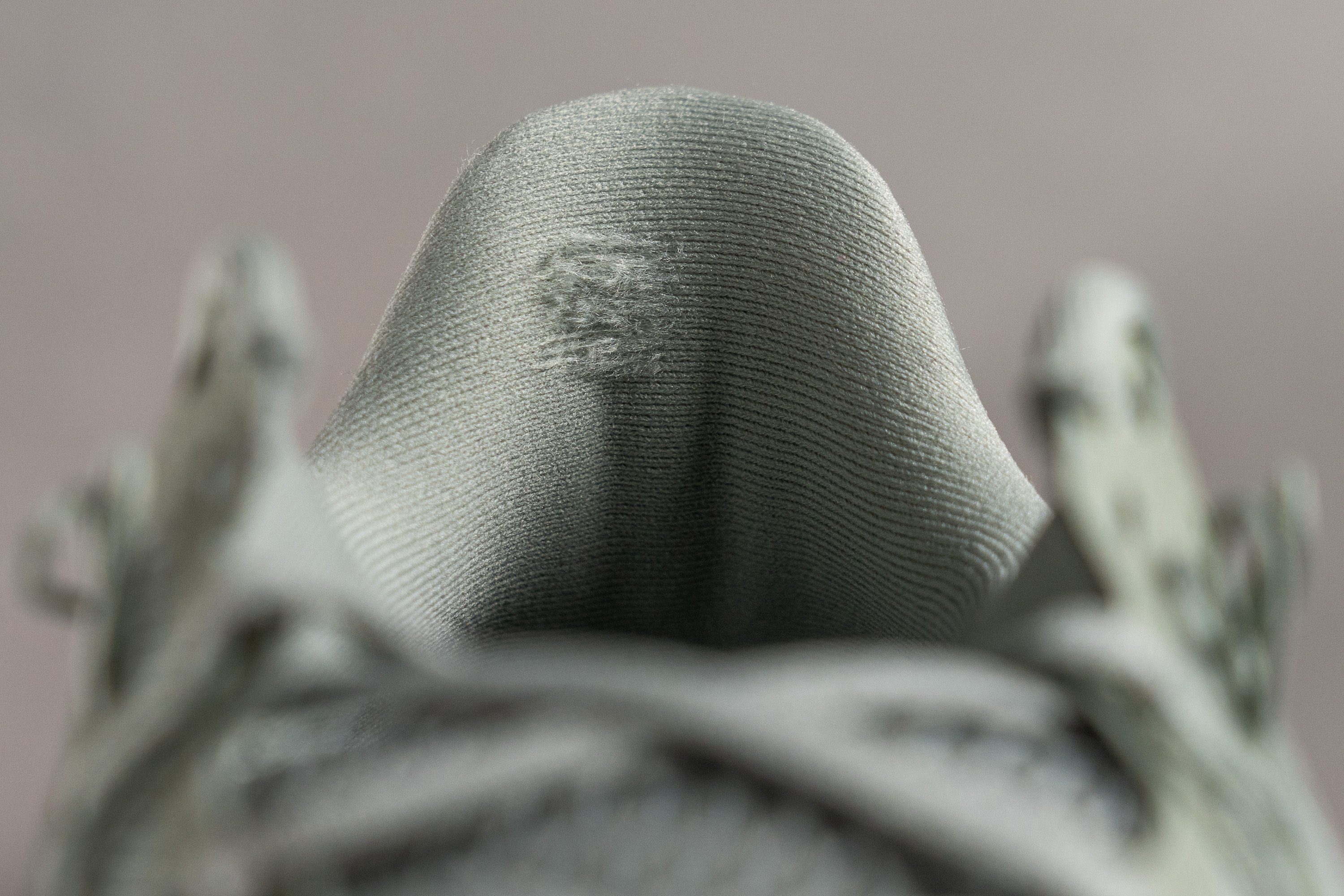
| Pegasus Trail 5 | 4 |
| Average | 3 |
Outsole hardness
Nike finally partnered with Vibram in 2023 to incorporate their outsoles, starting with the Ultrafly. Yet, the Pegasus Trail series has not adopted this upgrade, which is not ideal given that the outsole has consistently been a weak point in this model.
Nonetheless, there's a positive shift. While not Vibram, Nike's new 87.9-HC "All Terrain Compound" marks a significant improvement over previous versions.
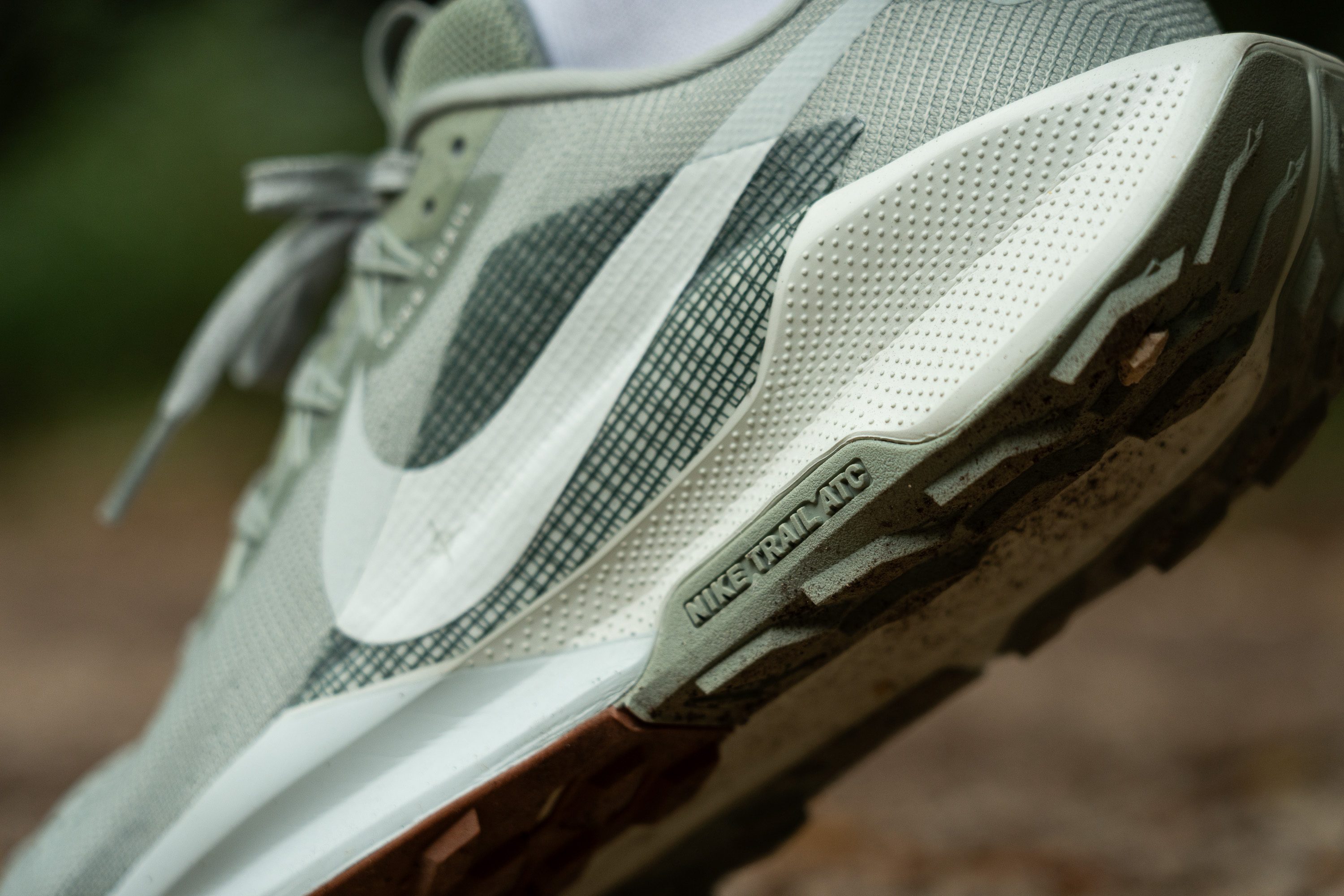
However, remember that this outsole focuses more on durability, ideal for handling both asphalt and concrete as a door-to-trail shoe. So it's a step forward, though expectations for traction should remain moderate.
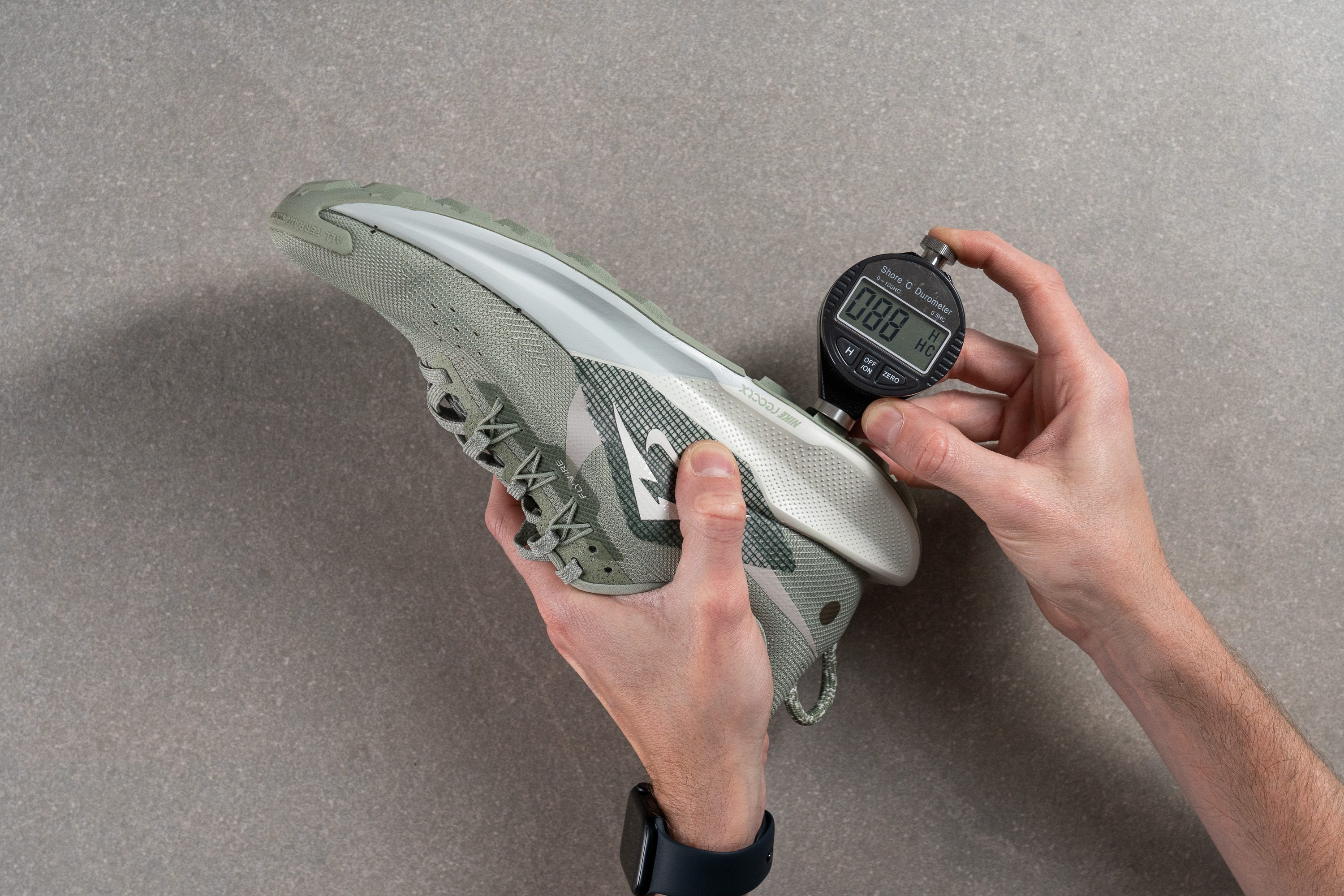
| Pegasus Trail 5 | 87.9 HC |
| Average | 85.8 HC |
Outsole durability
For us, it's crucial that a versatile shoe performs well in such tests, especially since the lugged design means there is less surface area making contact with the ground compared to a typical road outsole, potentially reducing its grip and durability.
Hence, in order to assess the durability of the Pegasus Trail 5, we conducted our final Dremel test of the day in the lab.
We discovered a mere 0.8-mm dent in the rubber—a promising result that confirms the shoe's good resistance to wear and tear.
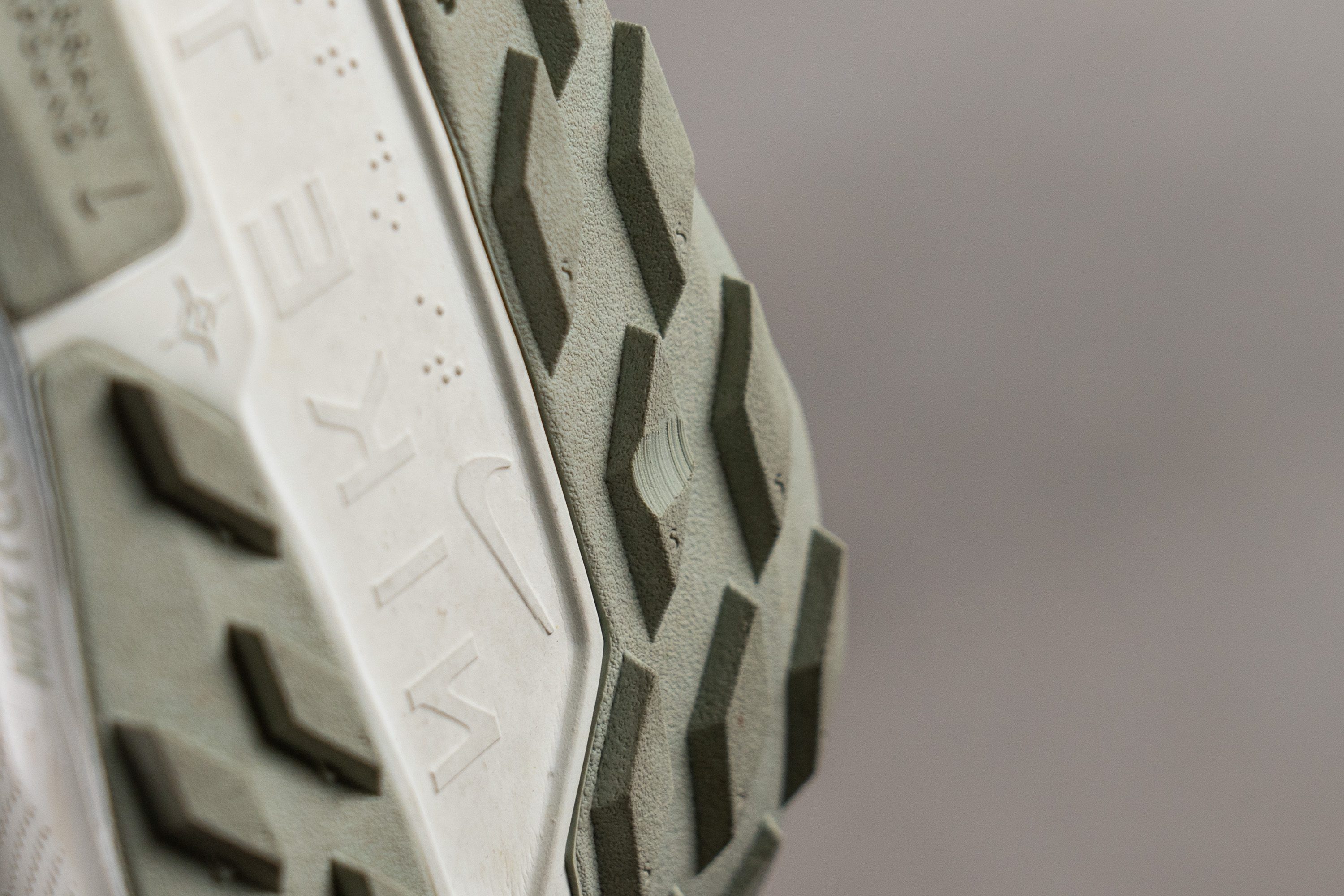
| Pegasus Trail 5 | 0.8 mm |
| Average | 0.9 mm |
Outsole thickness
Fortunately, our earlier tests yielded positive results, so the 2.2-mm outsole that we measured is more than capable of withstanding the typical wear and tear for this shoe.
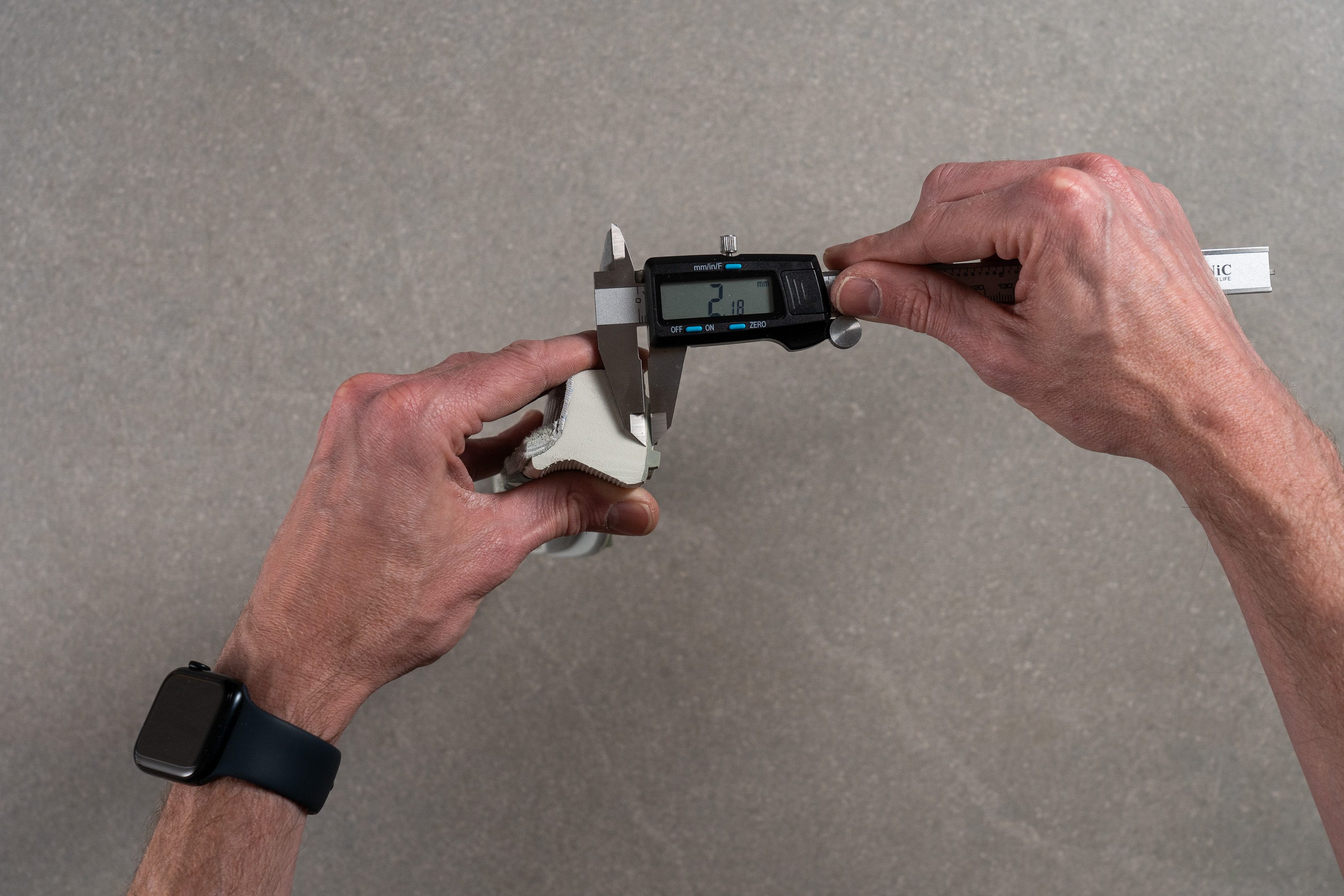
| Pegasus Trail 5 | 2.2 mm |
| Average | 2.2 mm |
Misc
Insole thickness
We found that the insole boasts a thickness of 4.9 mm, enhancing the overall plushness of the shoe.
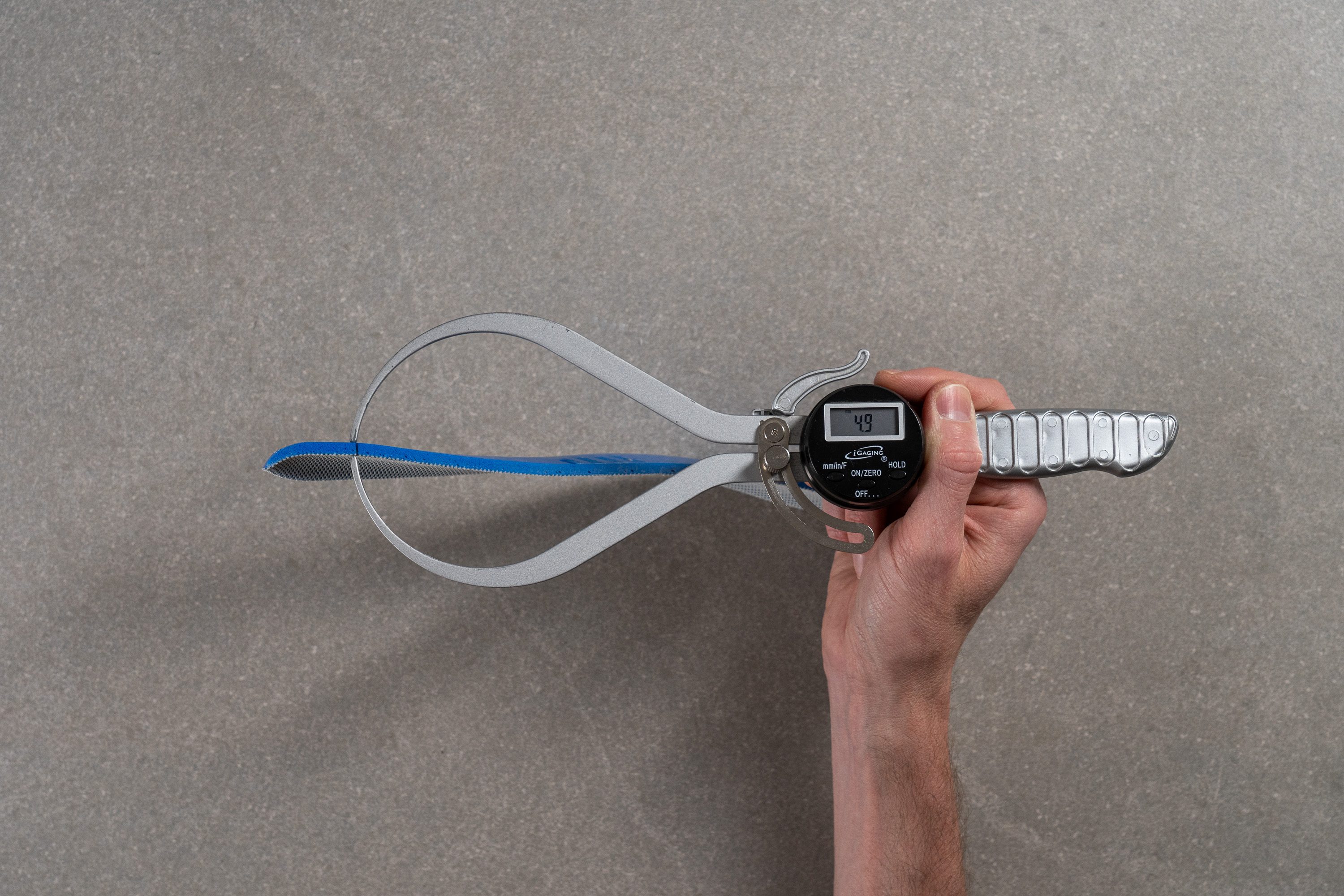
| Pegasus Trail 5 | 4.9 mm |
| Average | 4.7 mm |
Removable insole
The insole of the shoe is not glued or fixed, so is designed to be easily removable, which allows for easy substitution with custom footbeds.
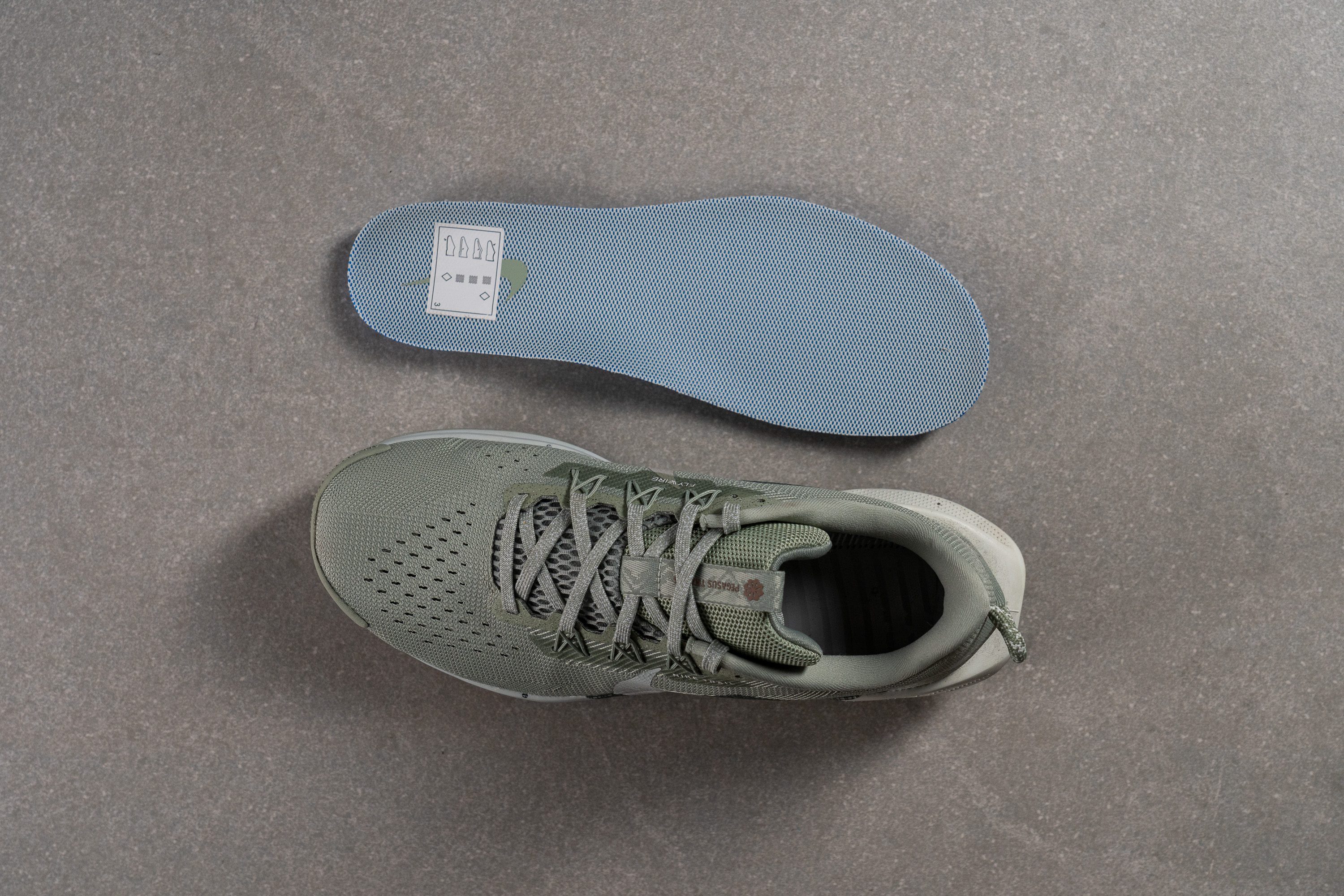
| Pegasus Trail 5 | Yes |
Midsole softness in cold (%)
After subjecting the shoe to freezing conditions, we observed a 31.4% change in softness—a decent result. This indicates that the PT5 will keep a consistent feel across various temperatures, though the alteration is discernible underfoot.
Interested in how temperature impacts foam materials? We can help you out with this guide.
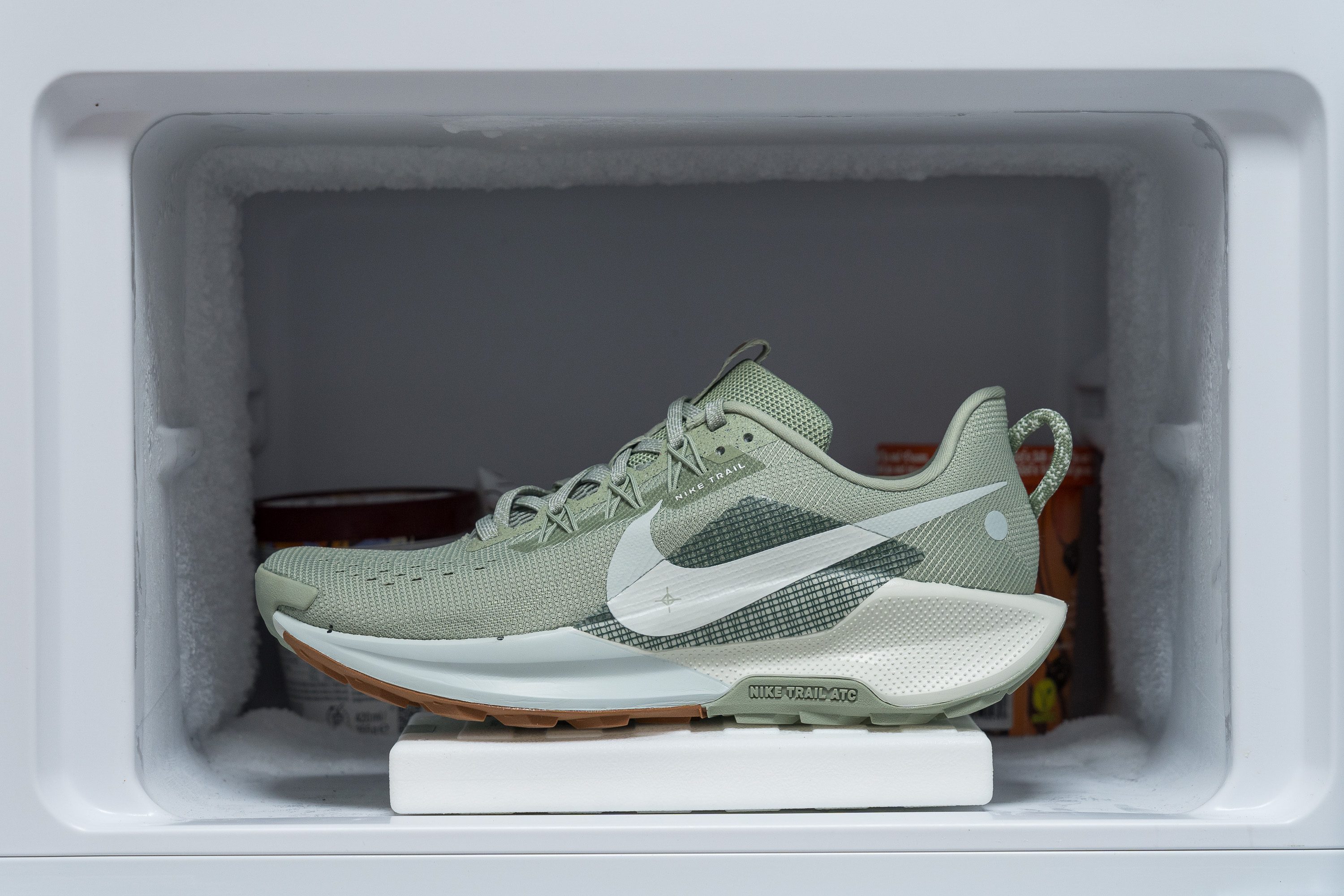
| Pegasus Trail 5 | 31% |
| Average | 26% |
Reflective elements
Nike has enhanced the Pegasus Trail 5 with the addition of circular reflective elements on the upper. Although basic, these reflectors mark a significant improvement over its predecessor, the v4, which lacked them.
| Pegasus Trail 5 | Yes |
Tongue padding
We found the tongue exceptionally comfortable, featuring 7.2 mm of padding from a single slab of foam—more than sufficient for all-day wear without being overly heavy or cumbersome.
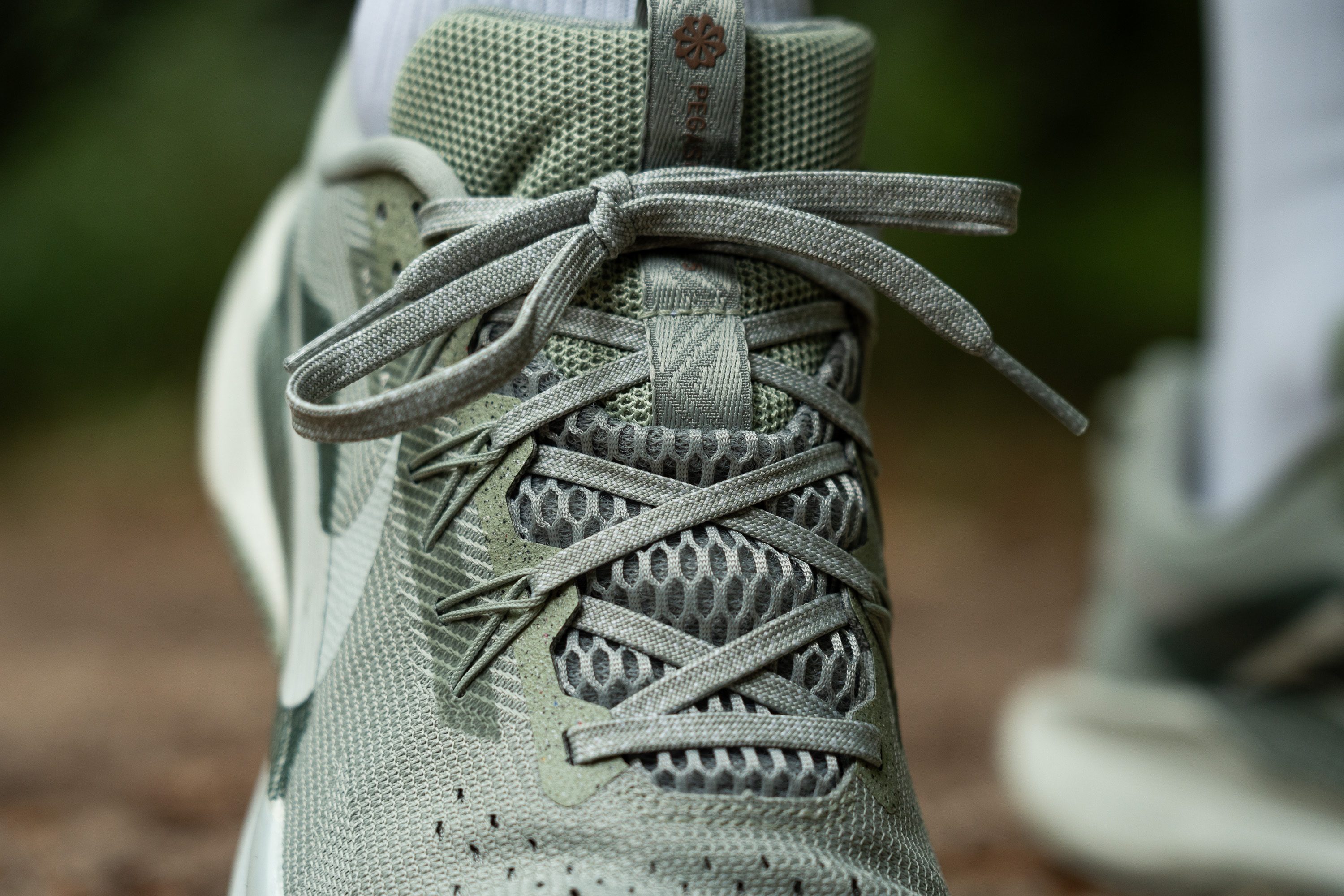
Additionally, we were pleased to see Nike keeping the Flywire lacing system from the Pegasus Trail 4, which has garnered widespread acclaim. In our experience, it's one of the few non-punched lacing systems that truly excels.
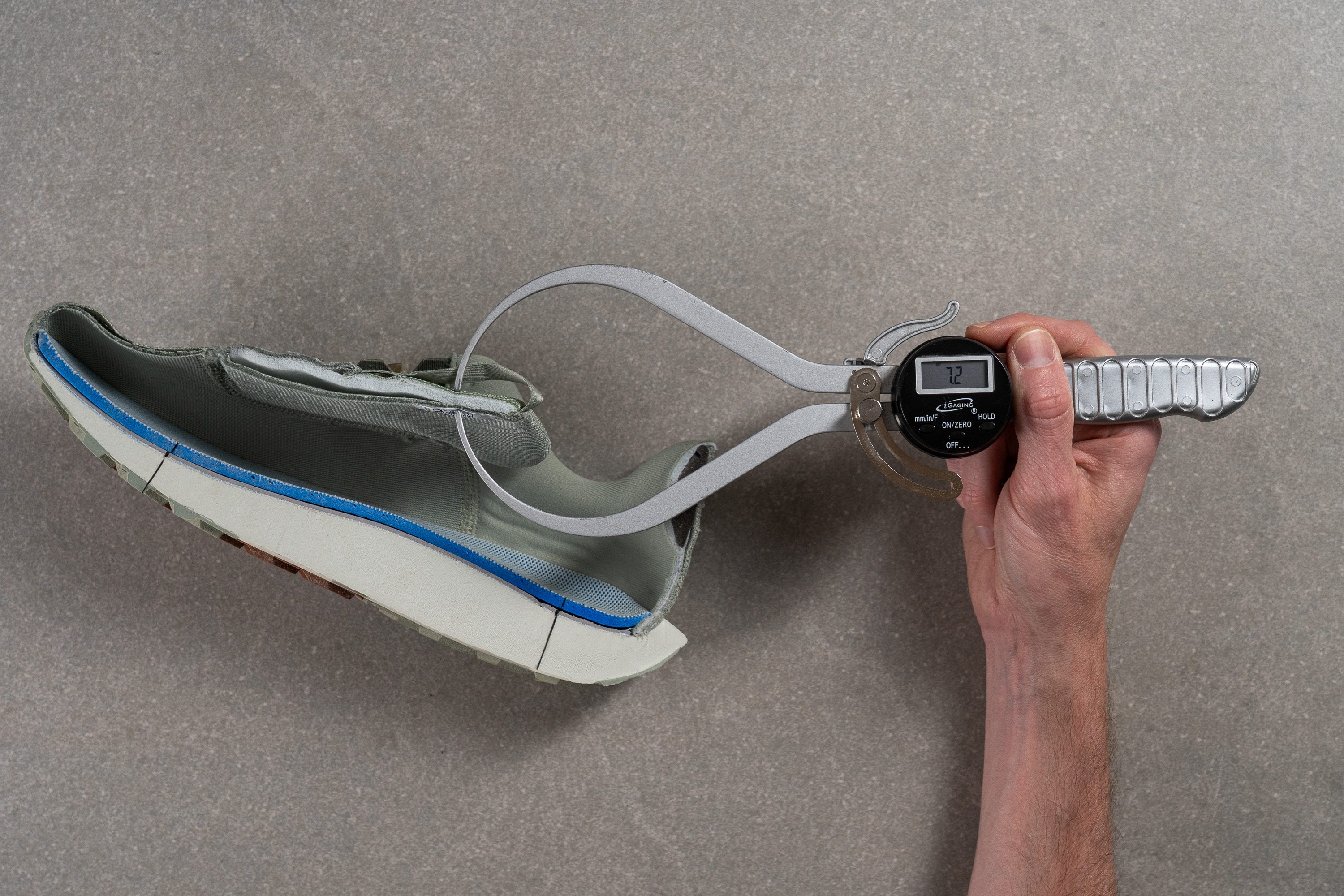
| Pegasus Trail 5 | 7.2 mm |
| Average | 6.4 mm |
Tongue: gusset type
We believe that a gusseted tongue is essential for any trail shoe, and the Pegasus Trail 5, despite its reasonable $150 price point—well below the top-tier market—successfully incorporates this feature.
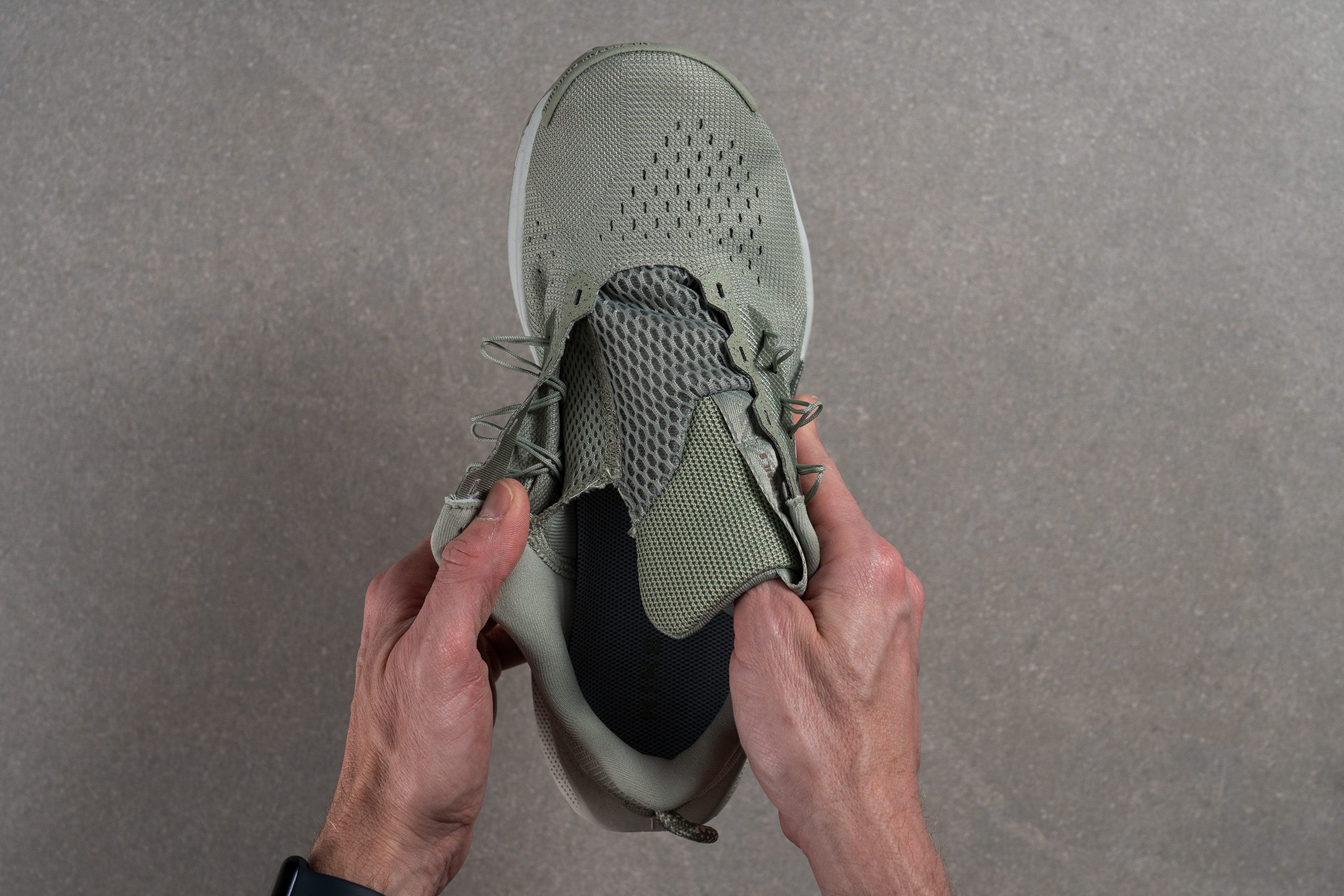
| Pegasus Trail 5 | Both sides (full) |
Heel tab
The heel is equipped with a high-quality, vertical finger-loop heel tab—a feature we liked. It's a unique and convenient tab that sets it apart from previous Pegasus Trails.
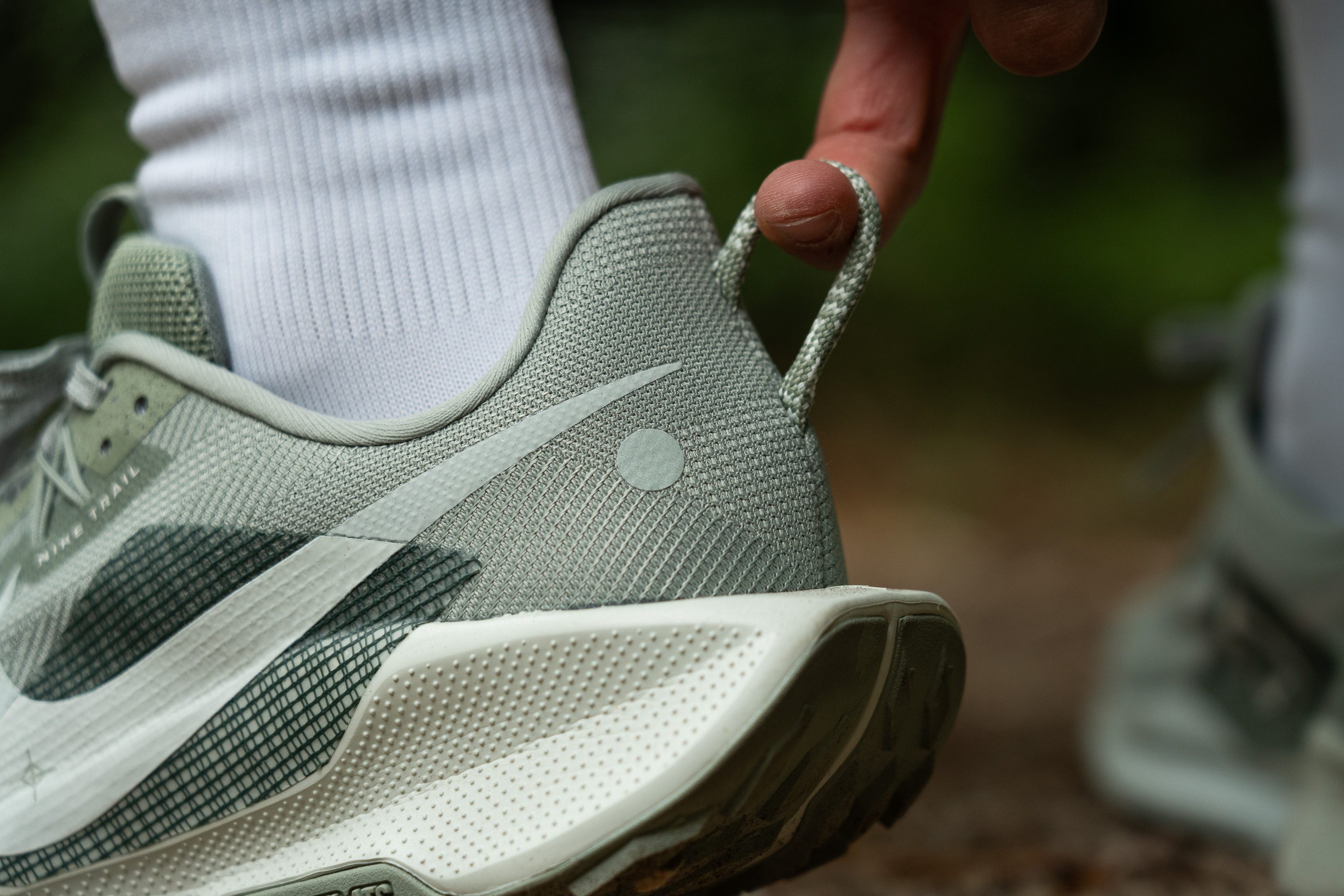
| Pegasus Trail 5 | Finger loop |

